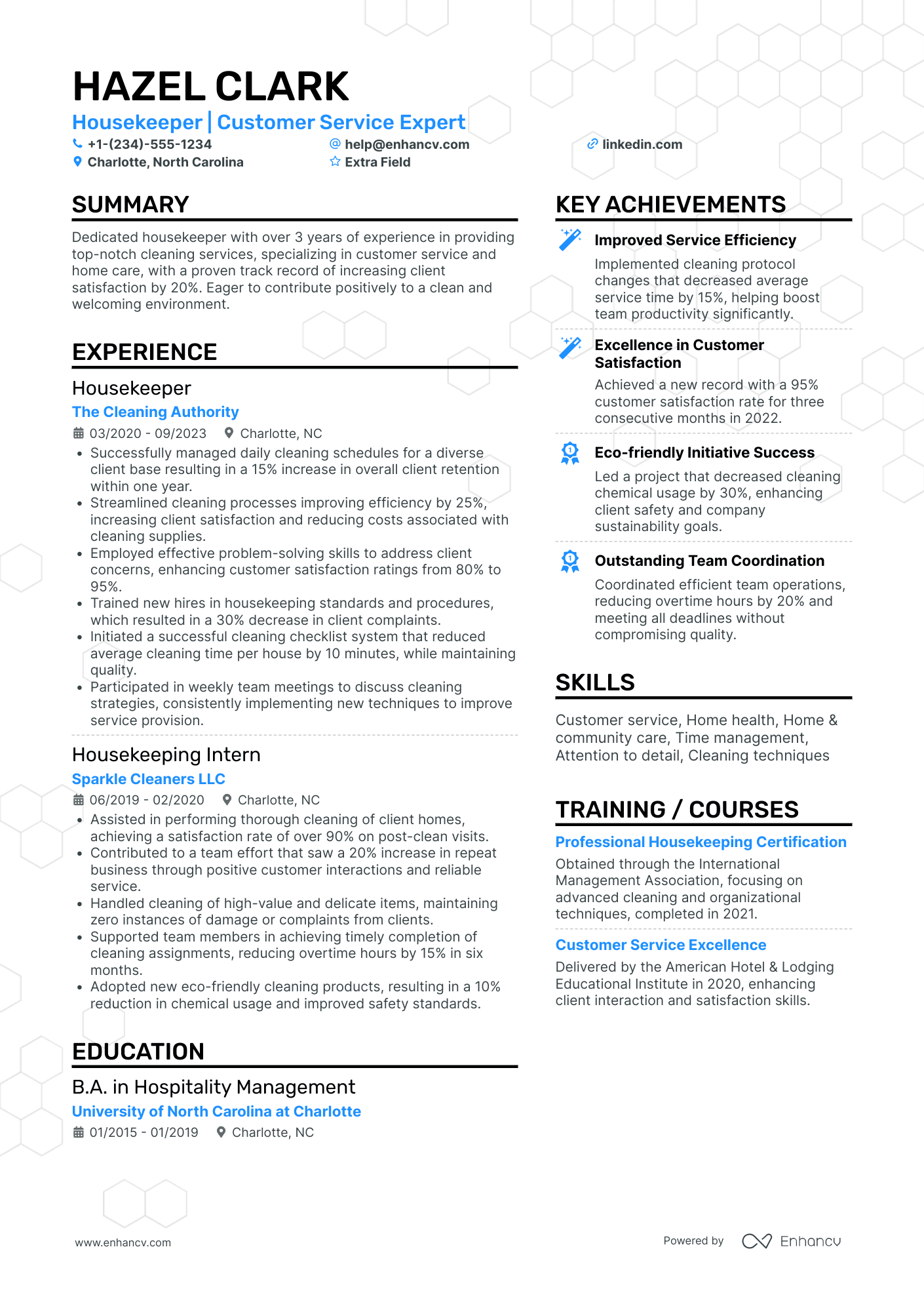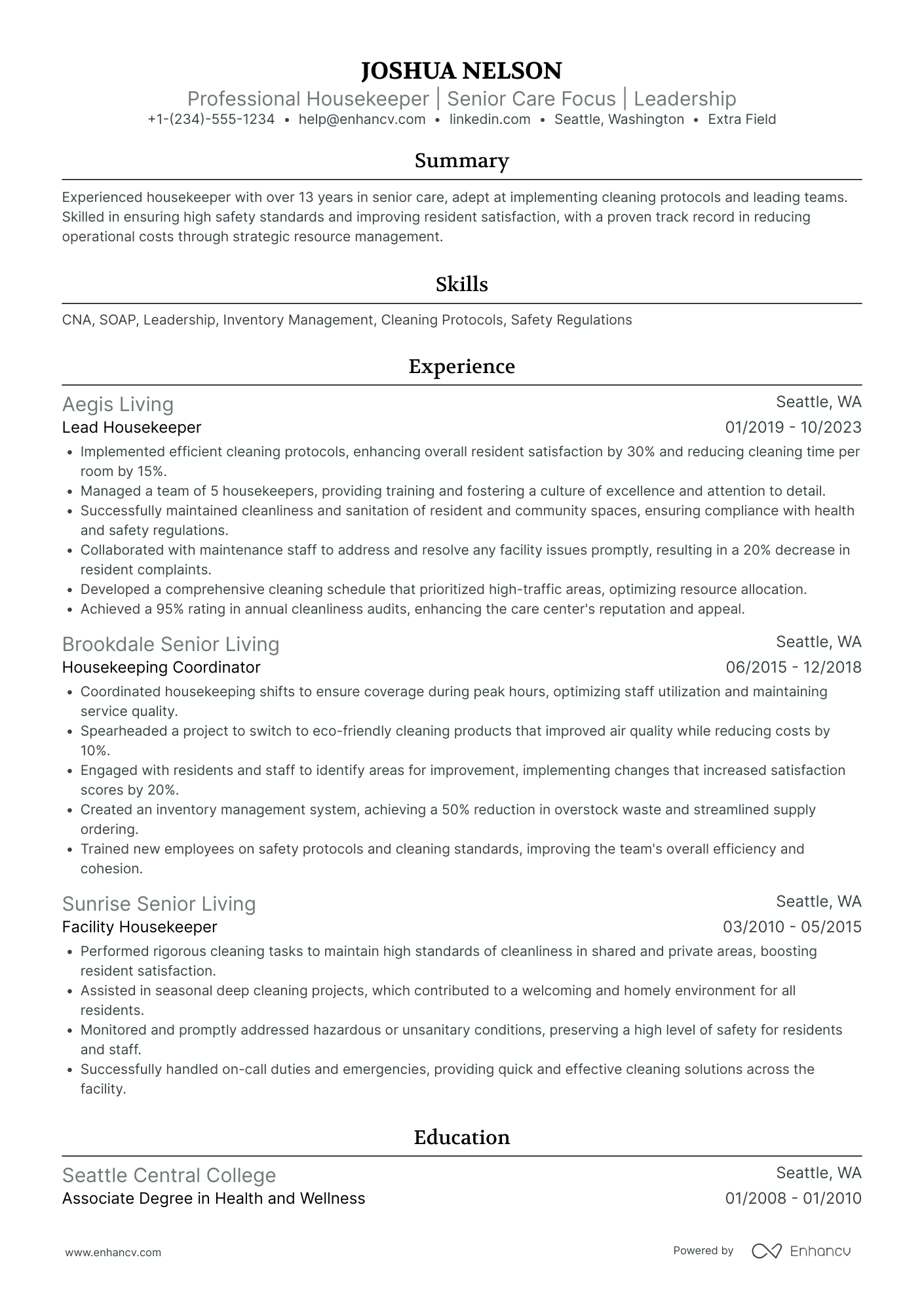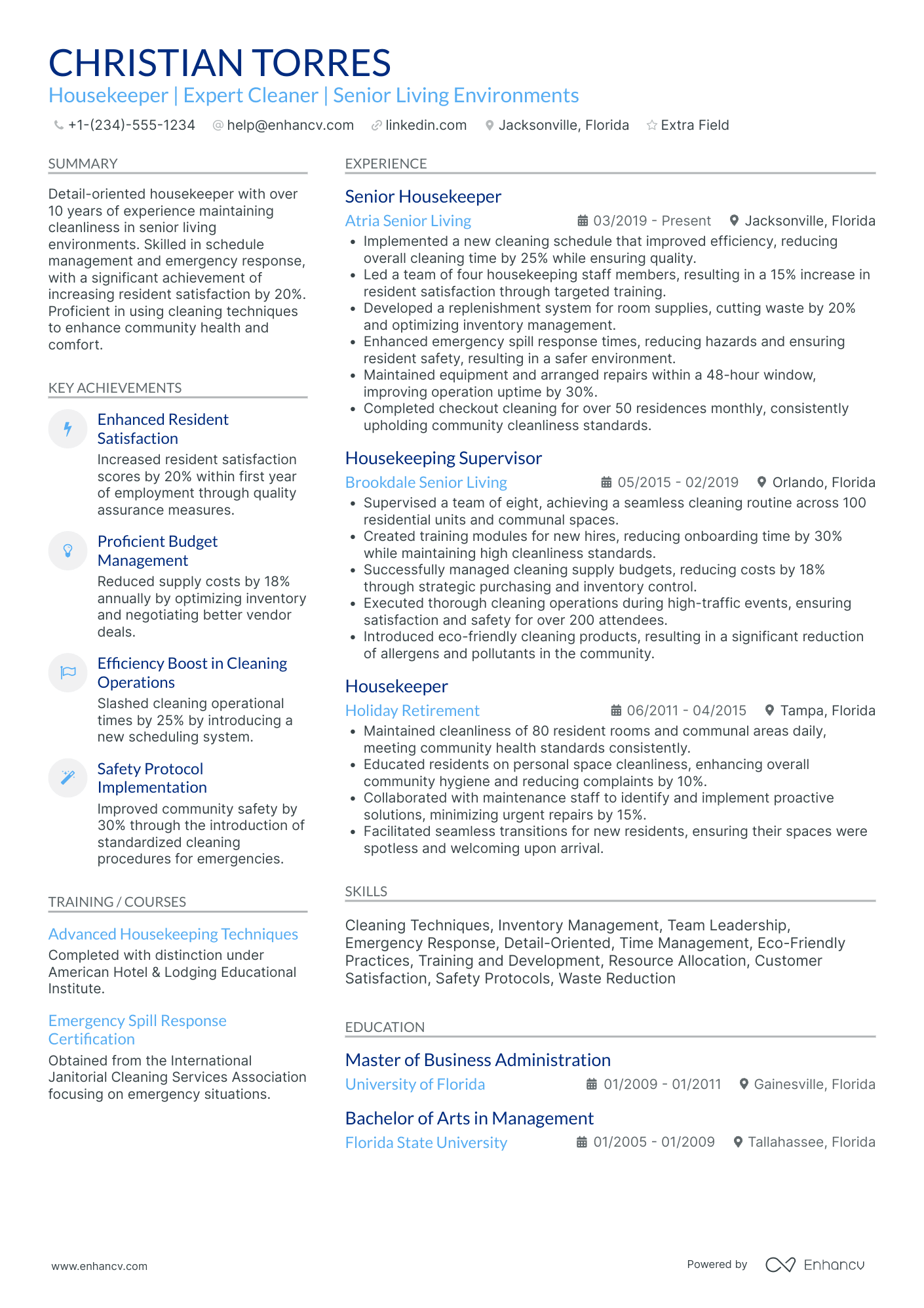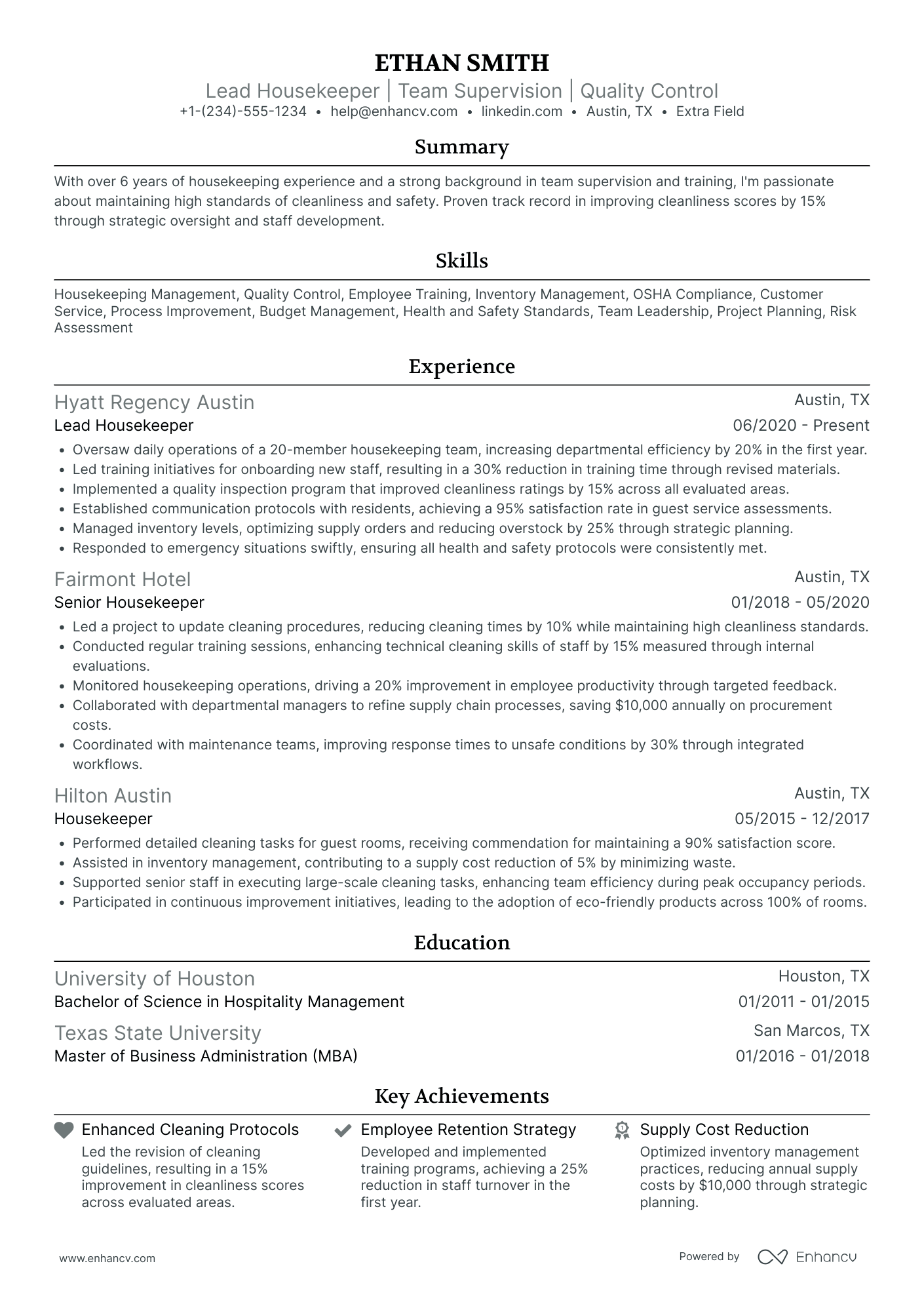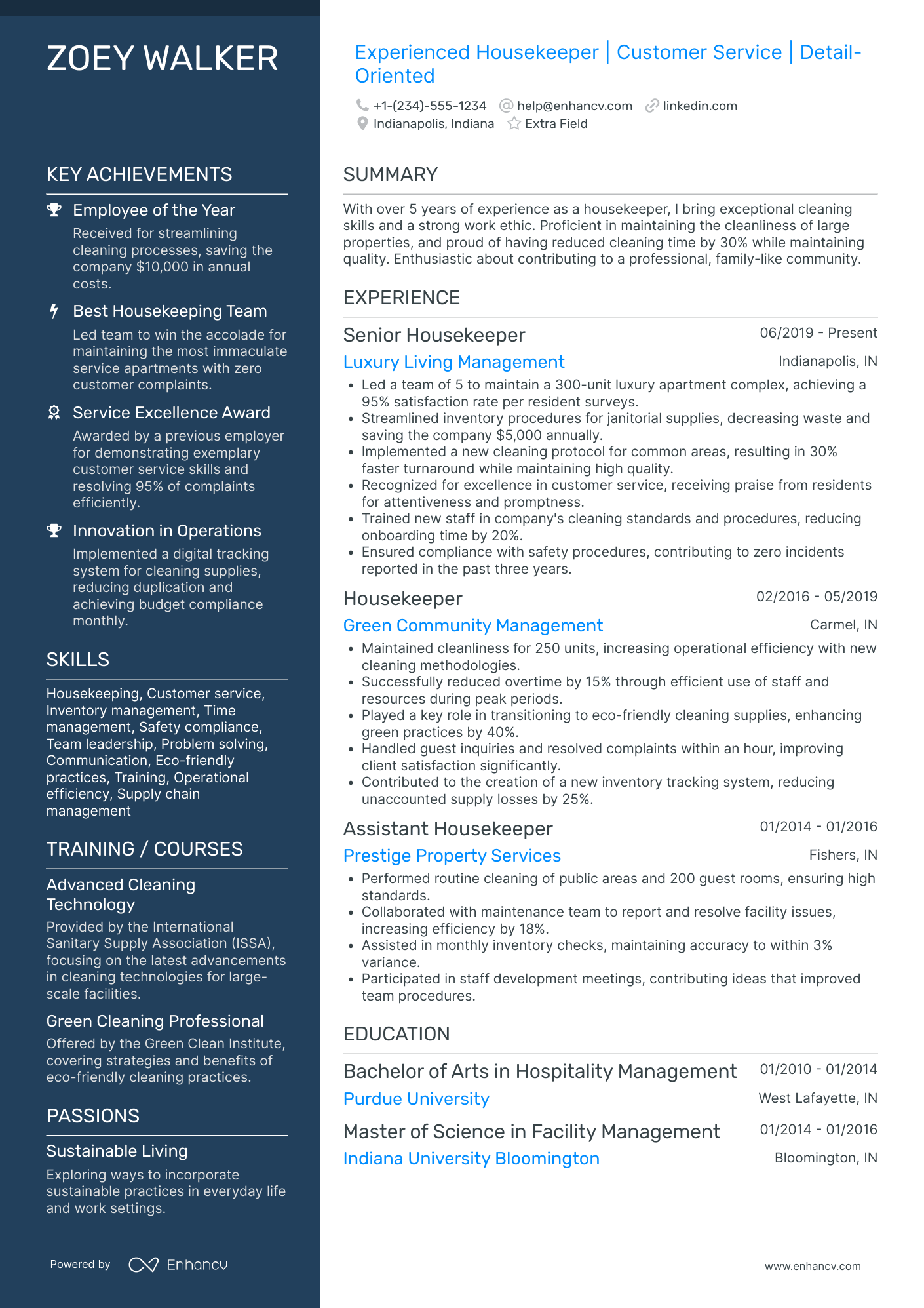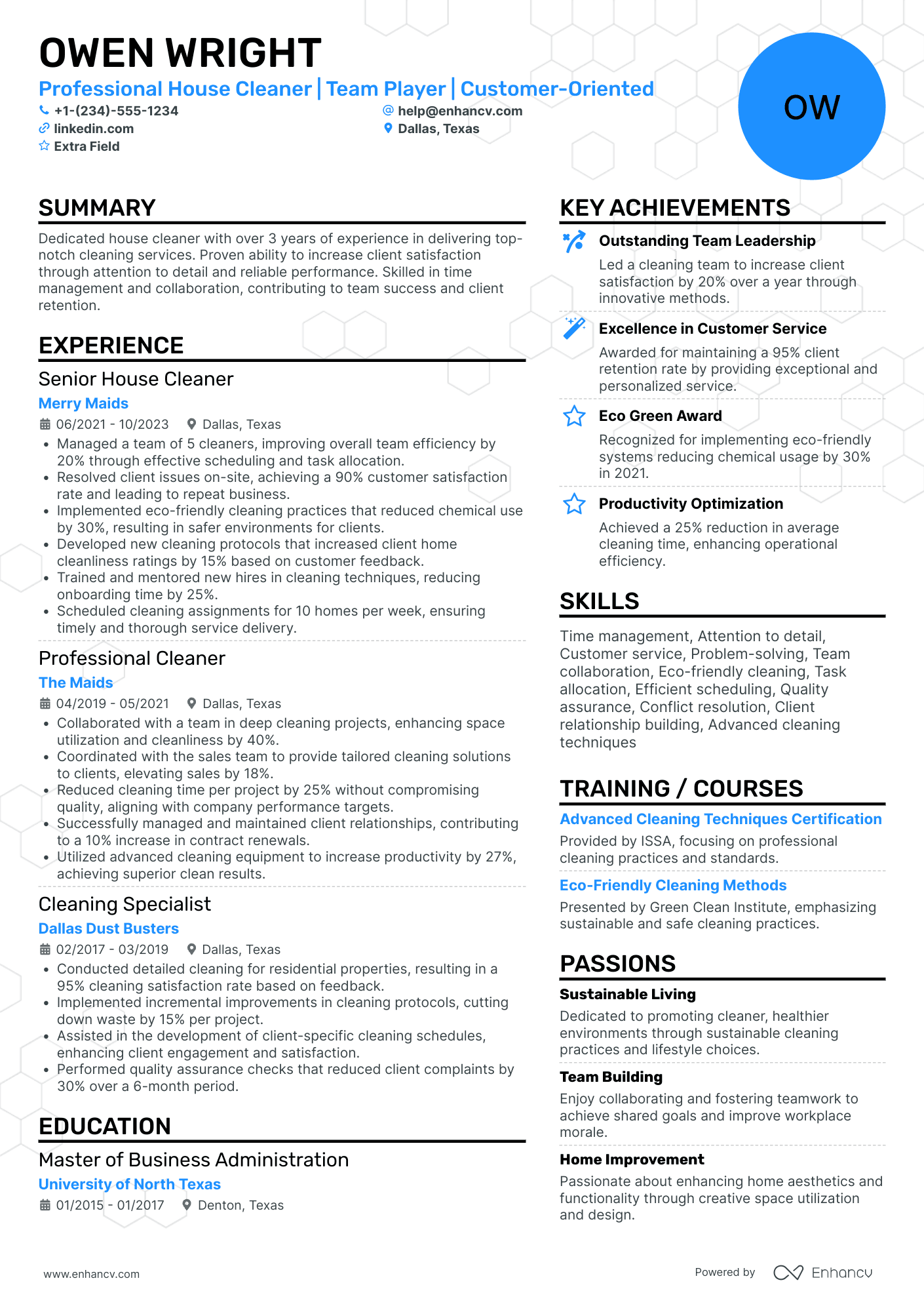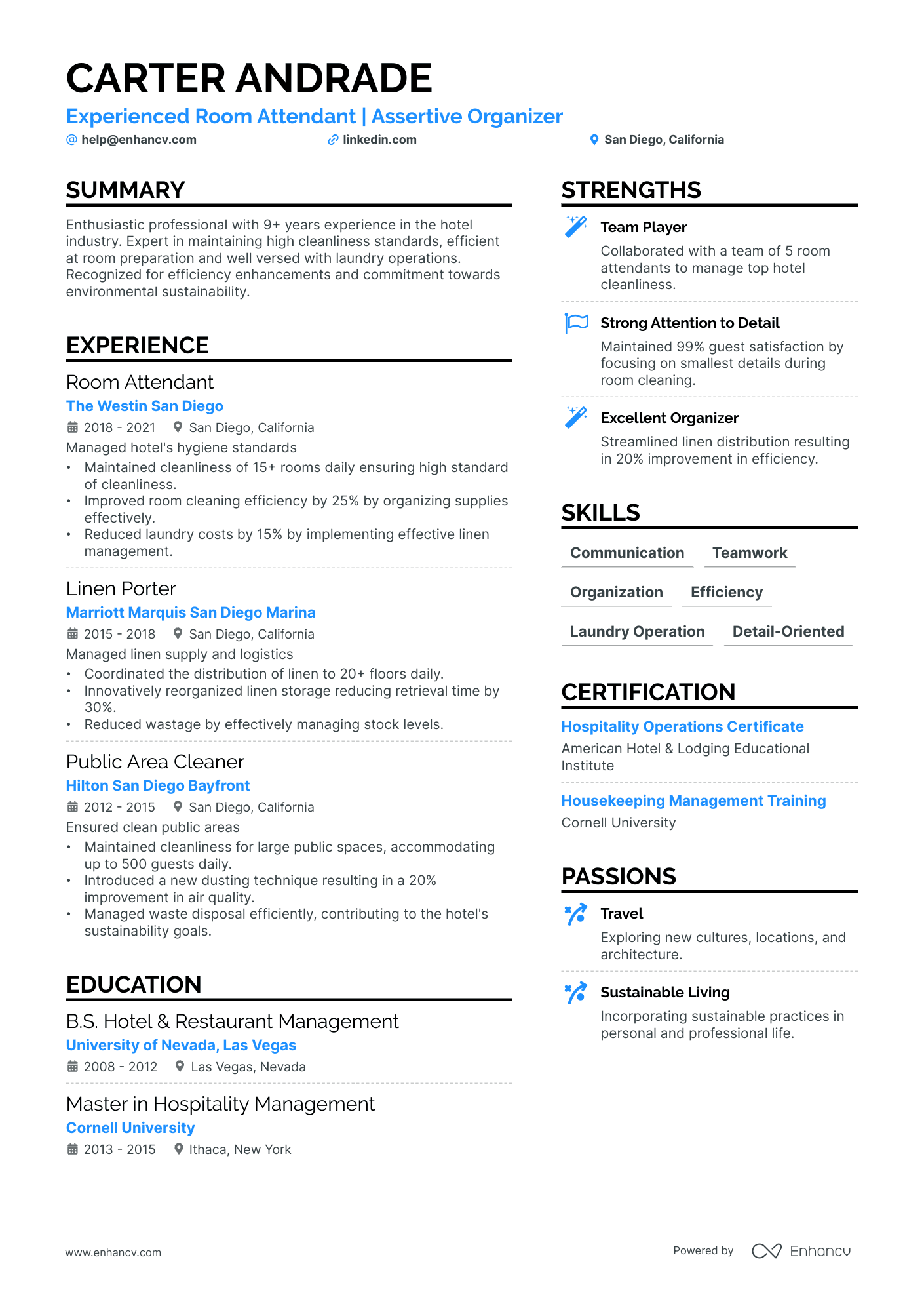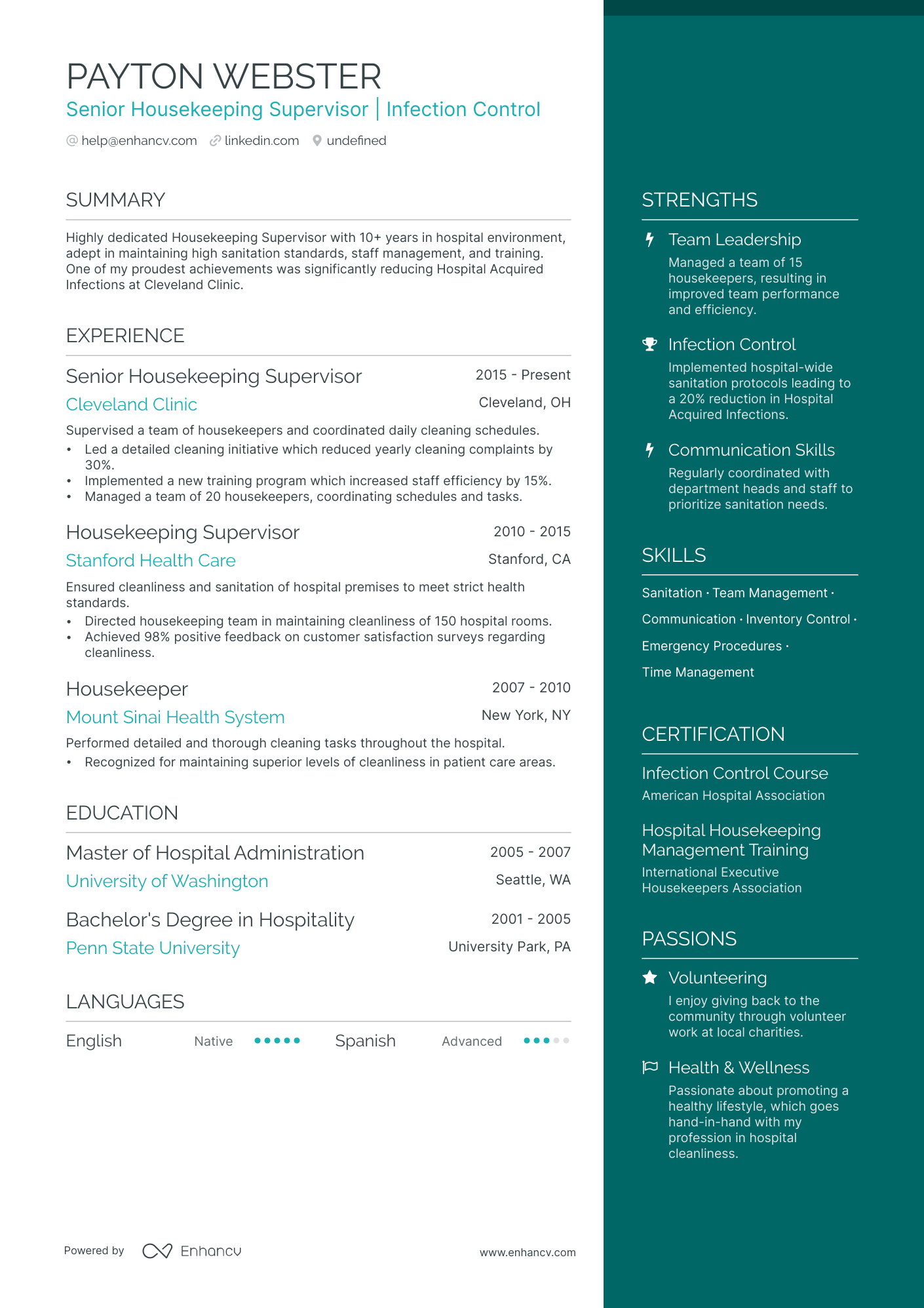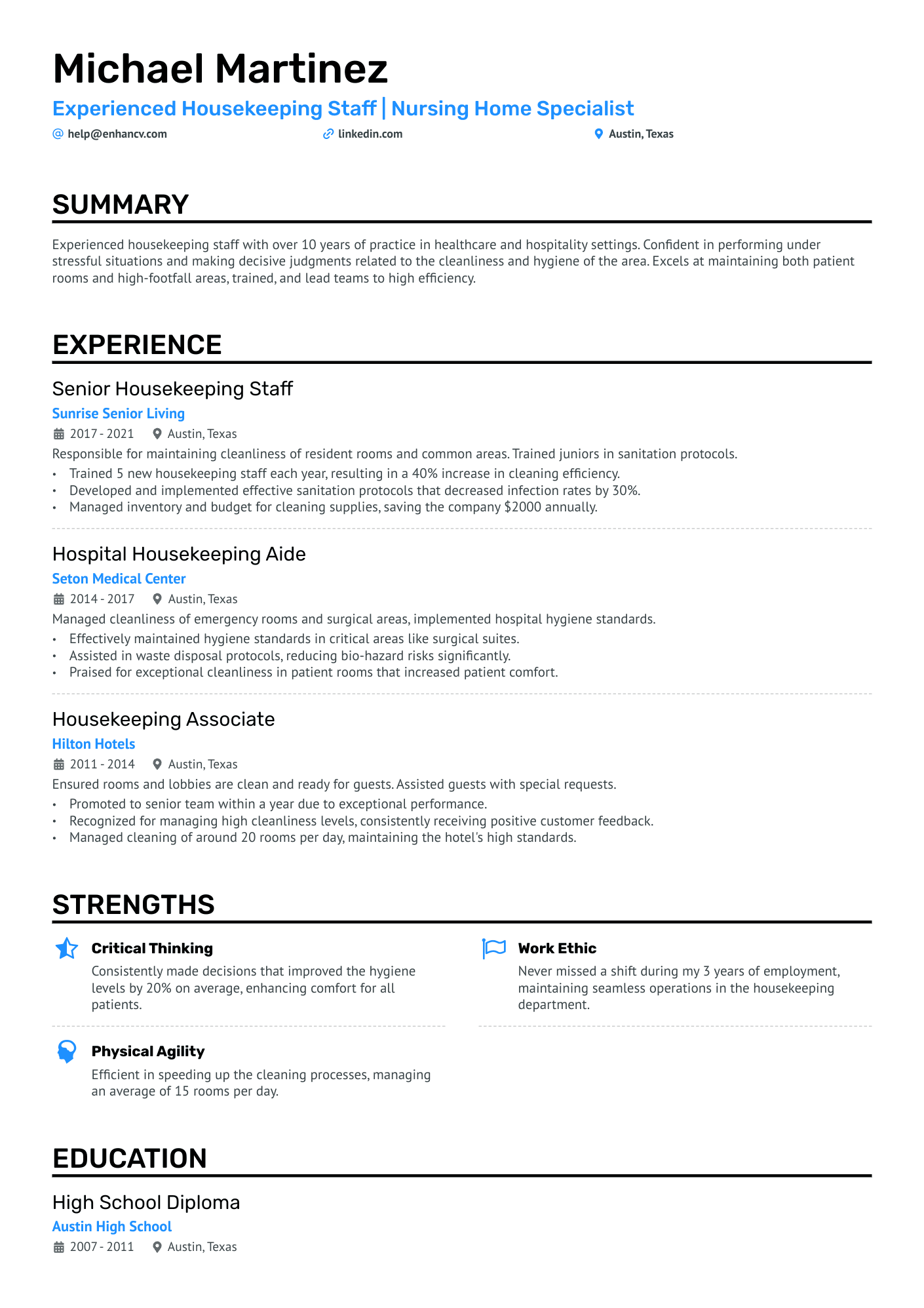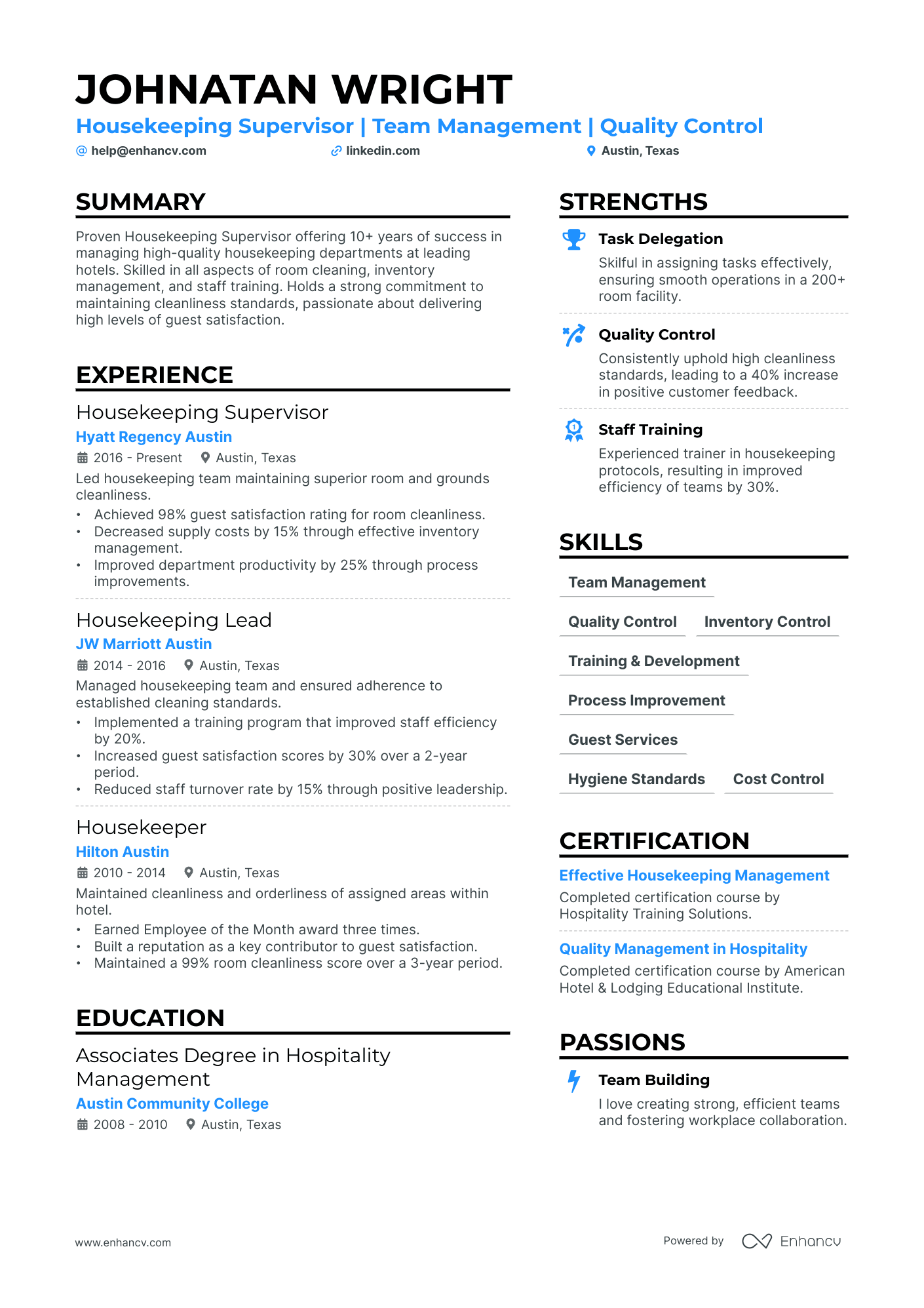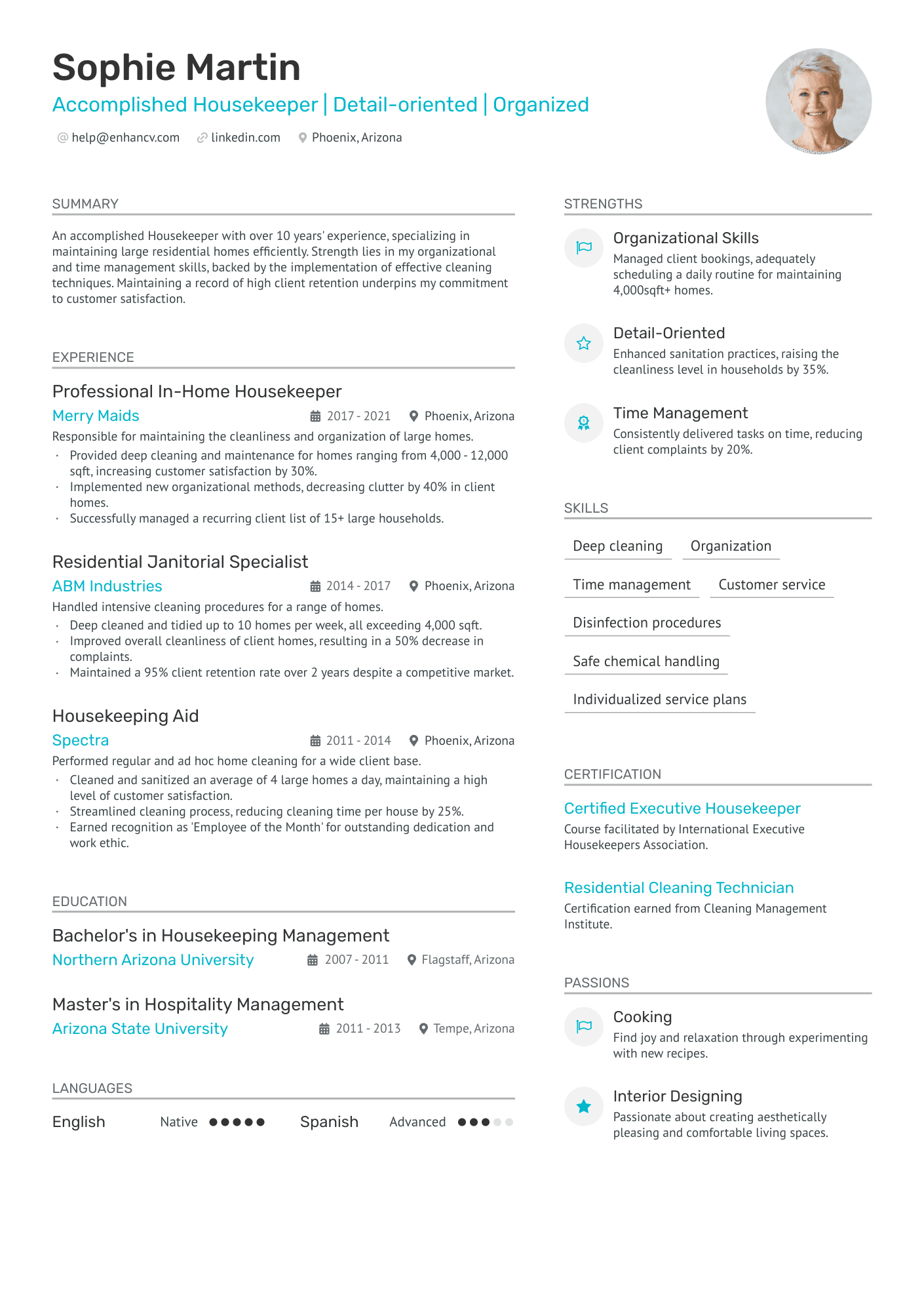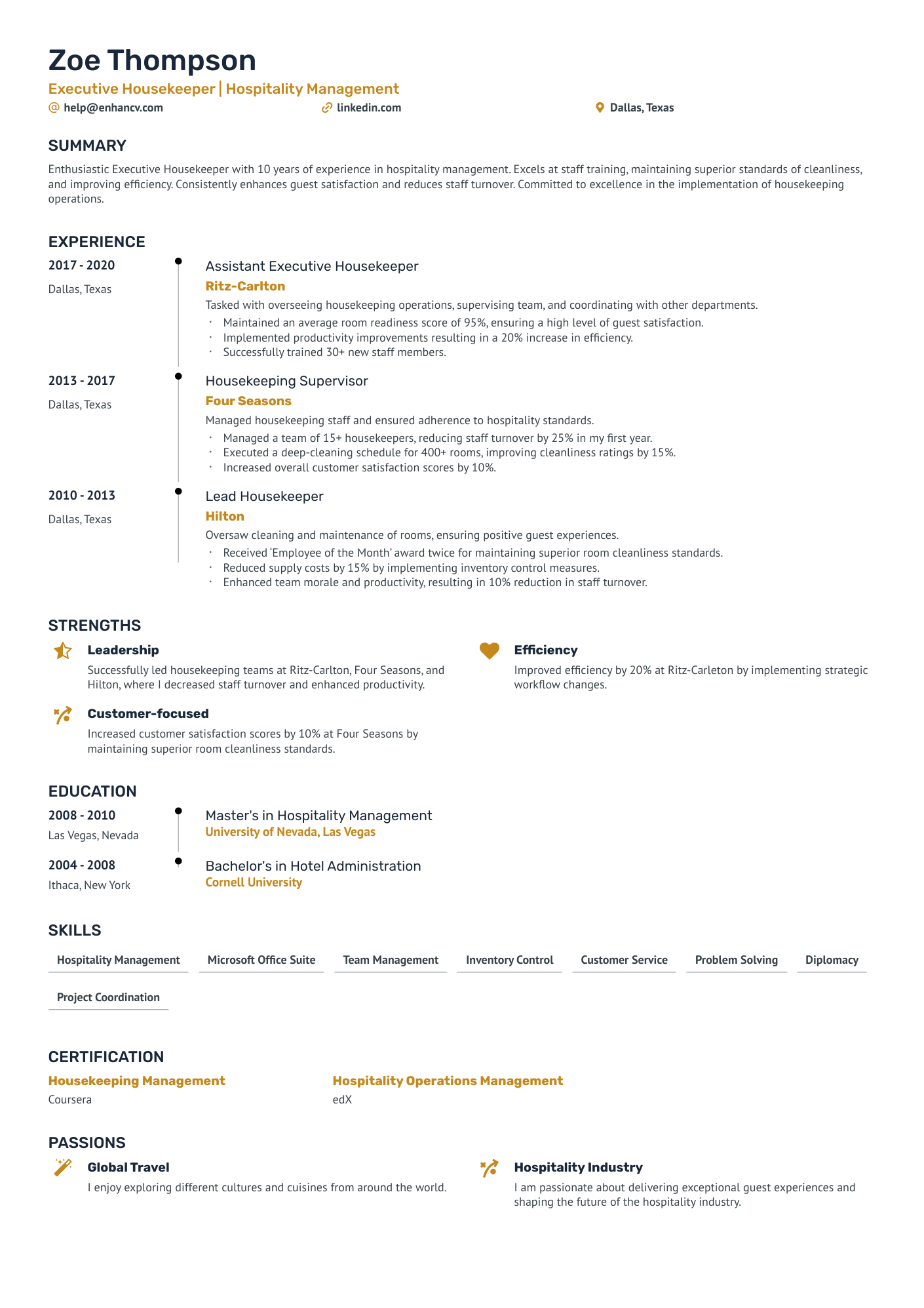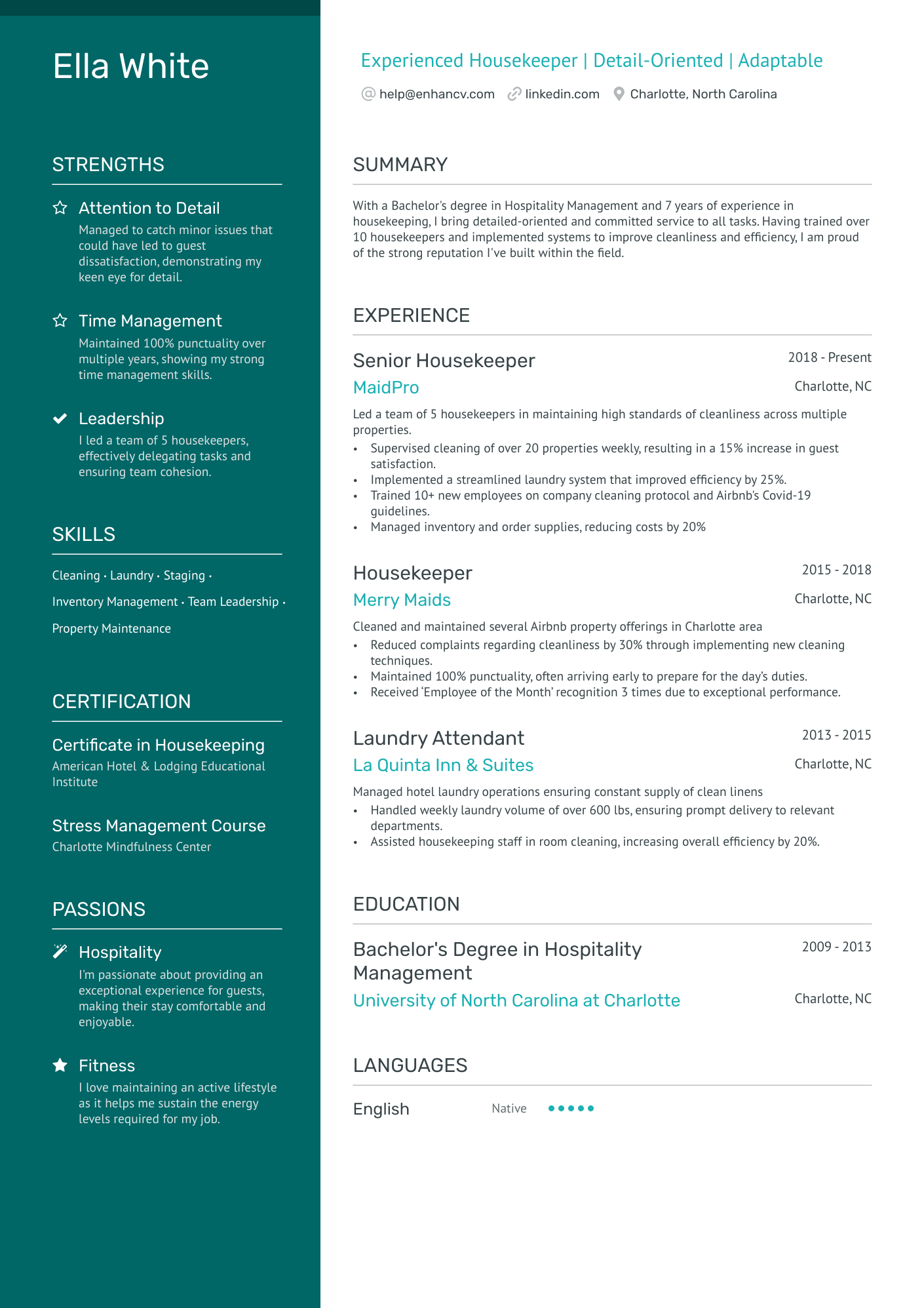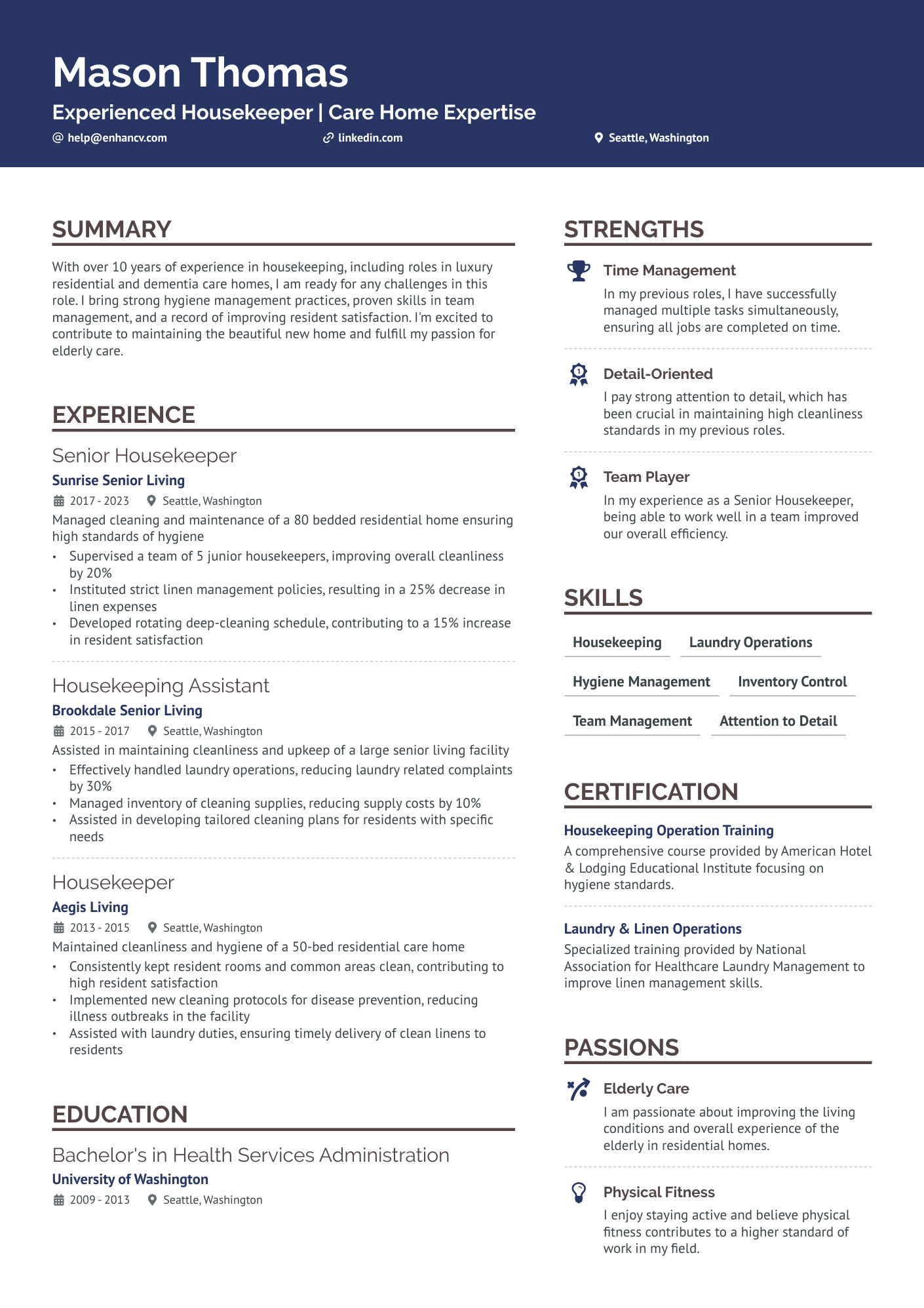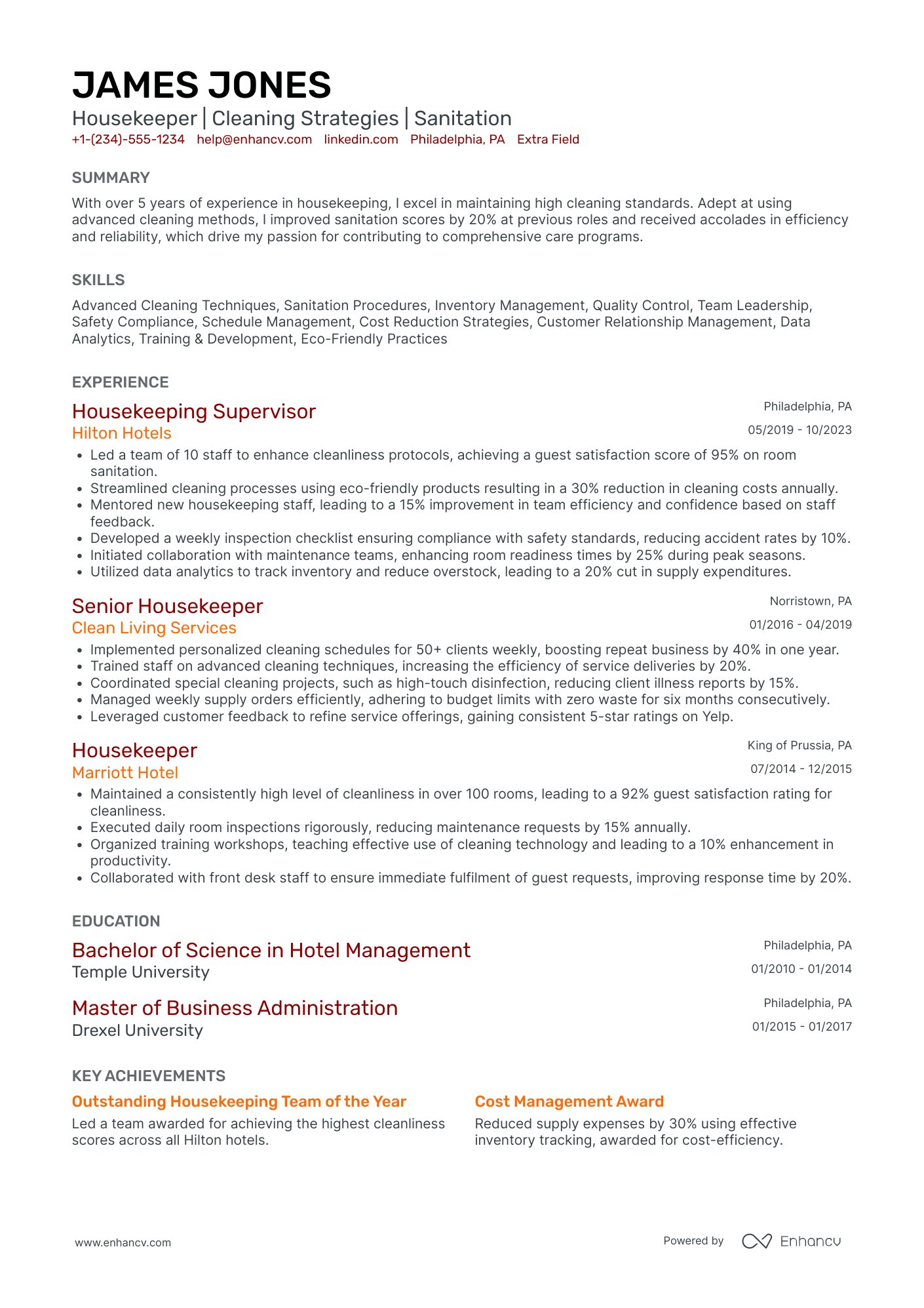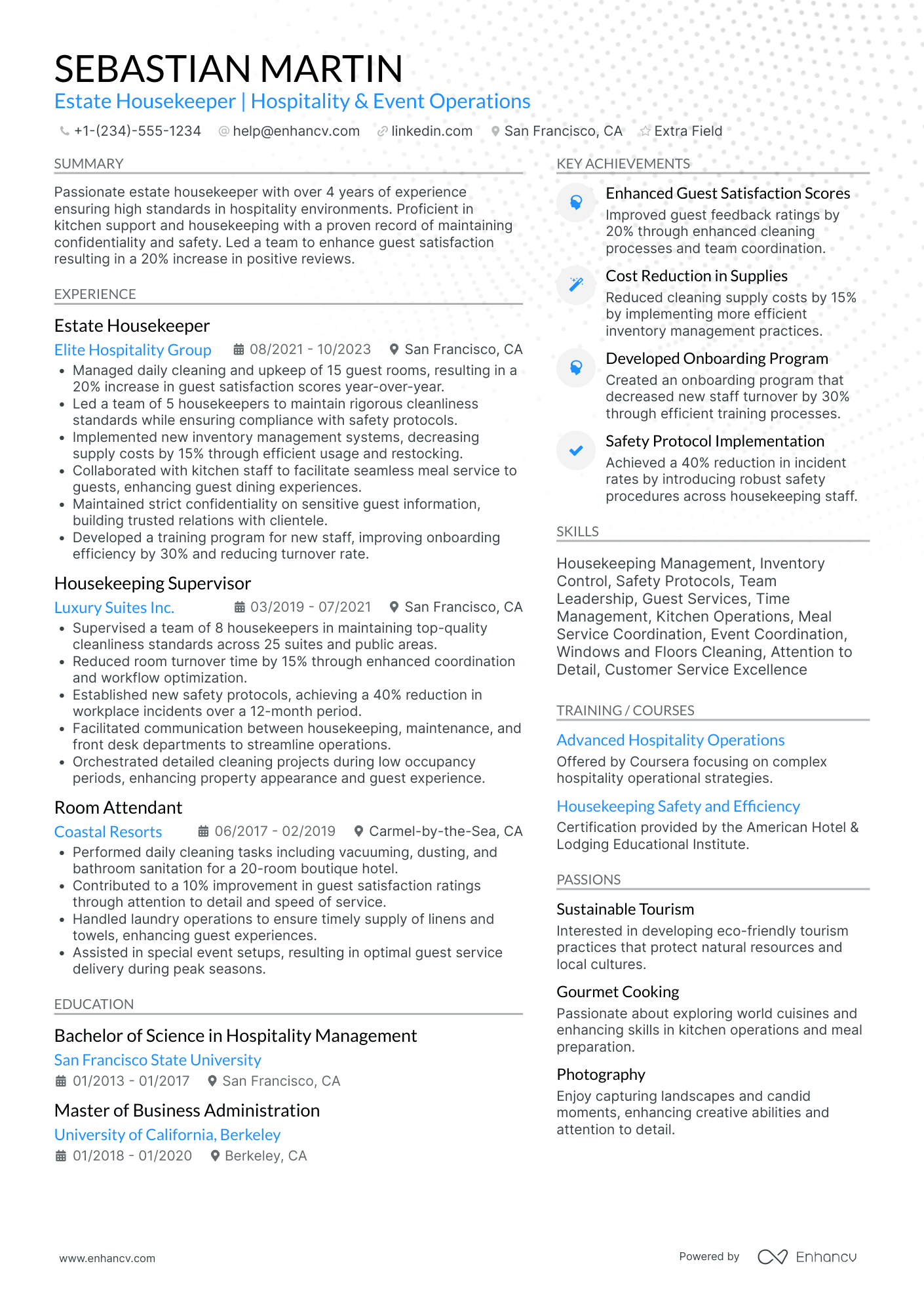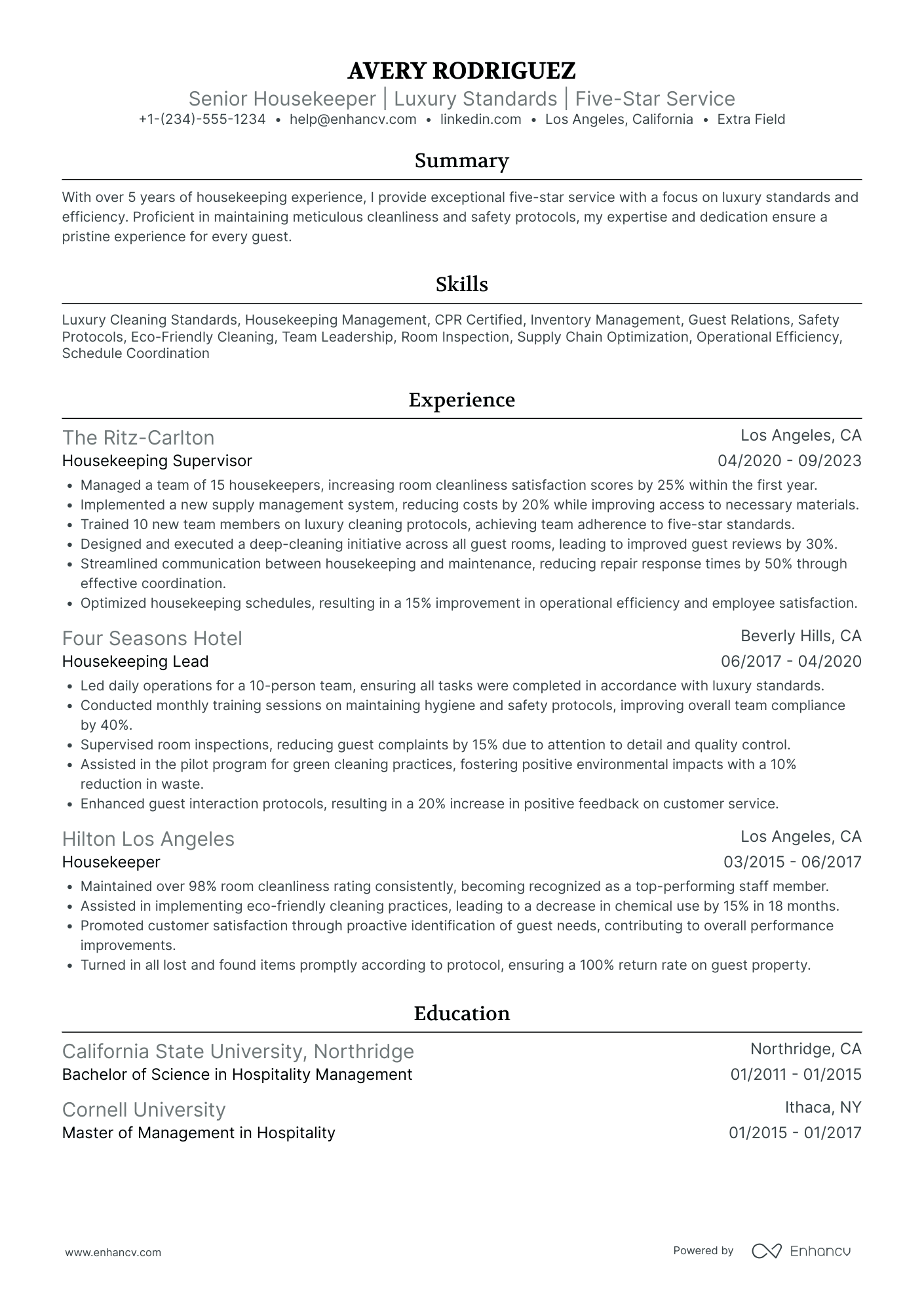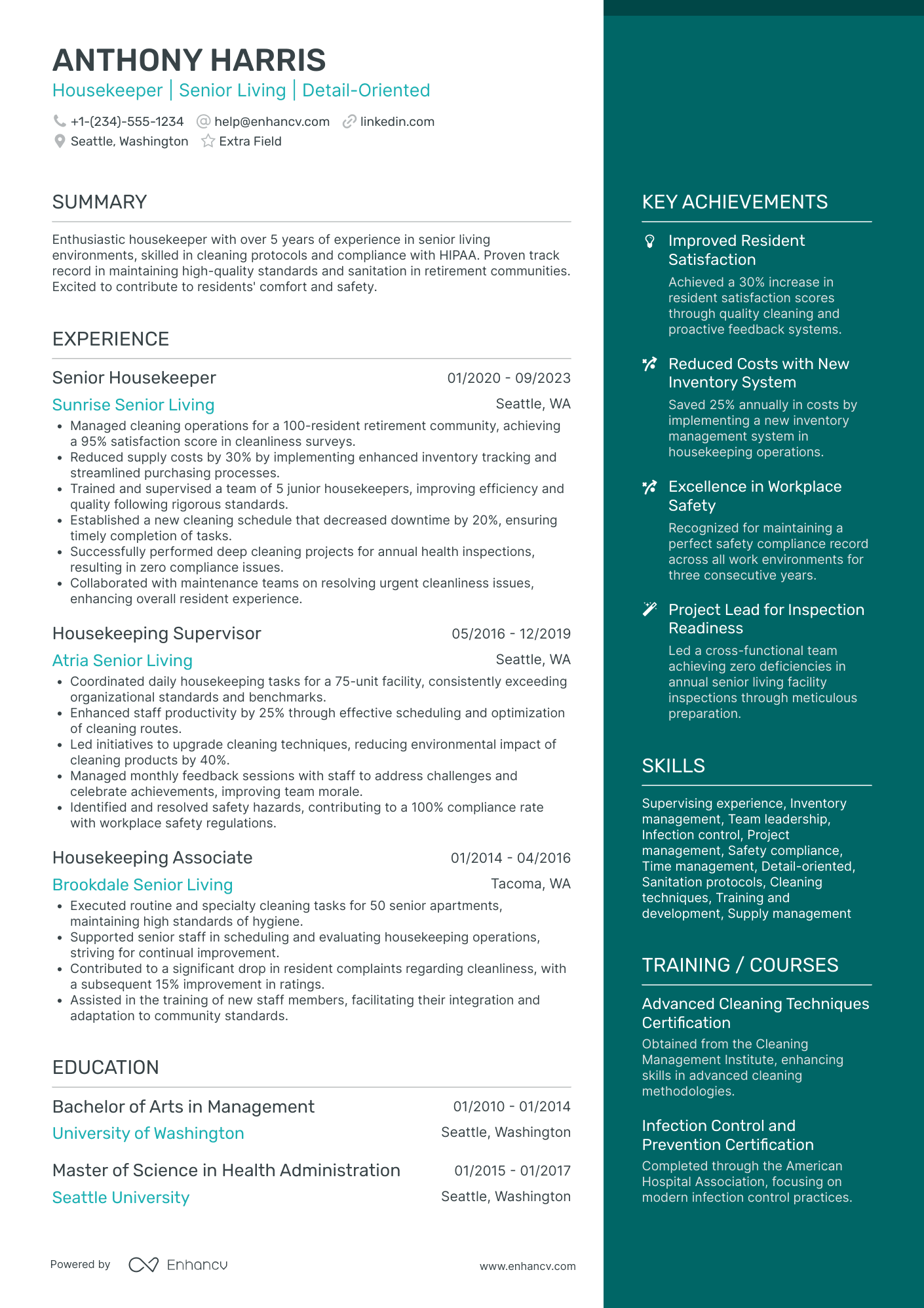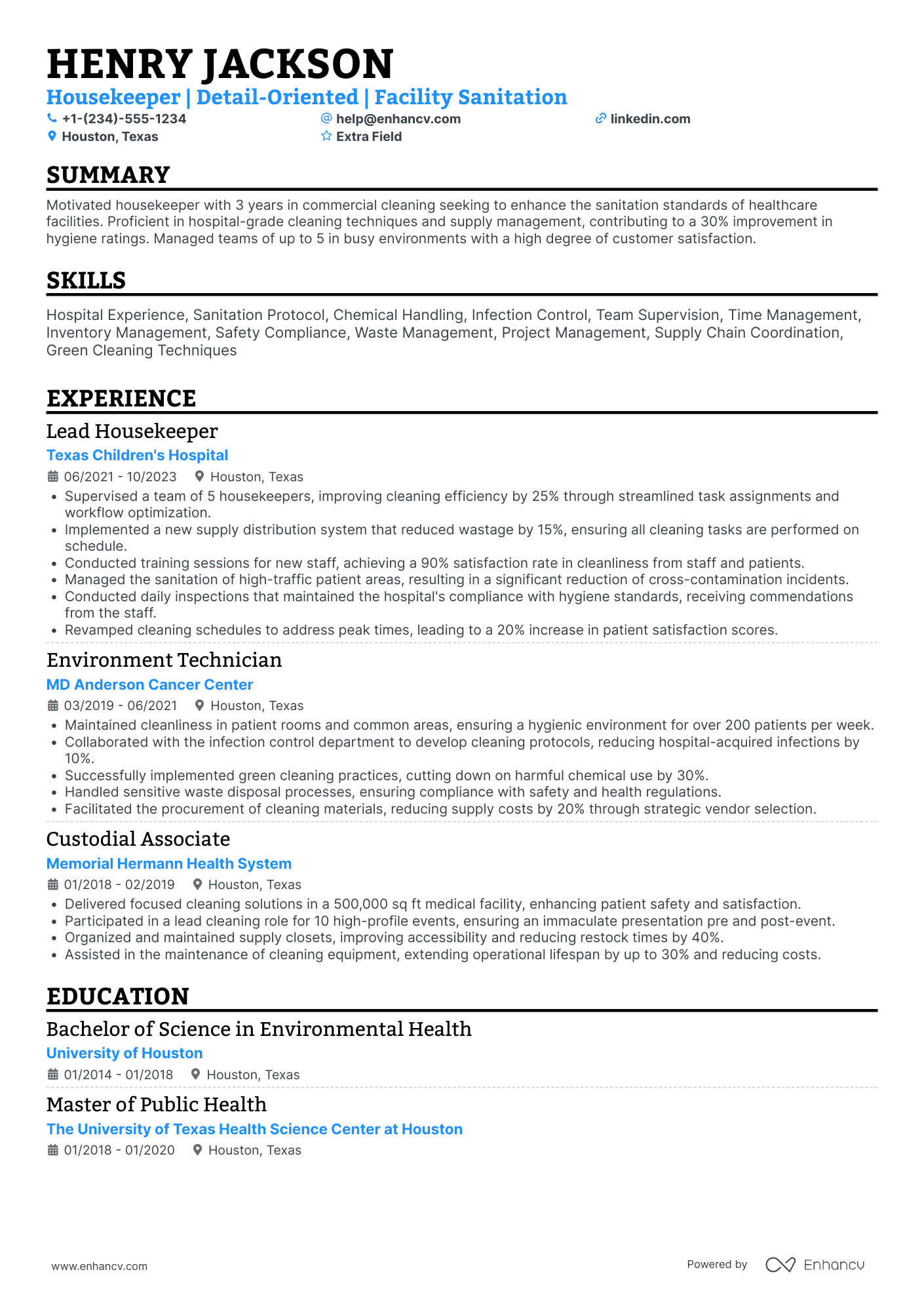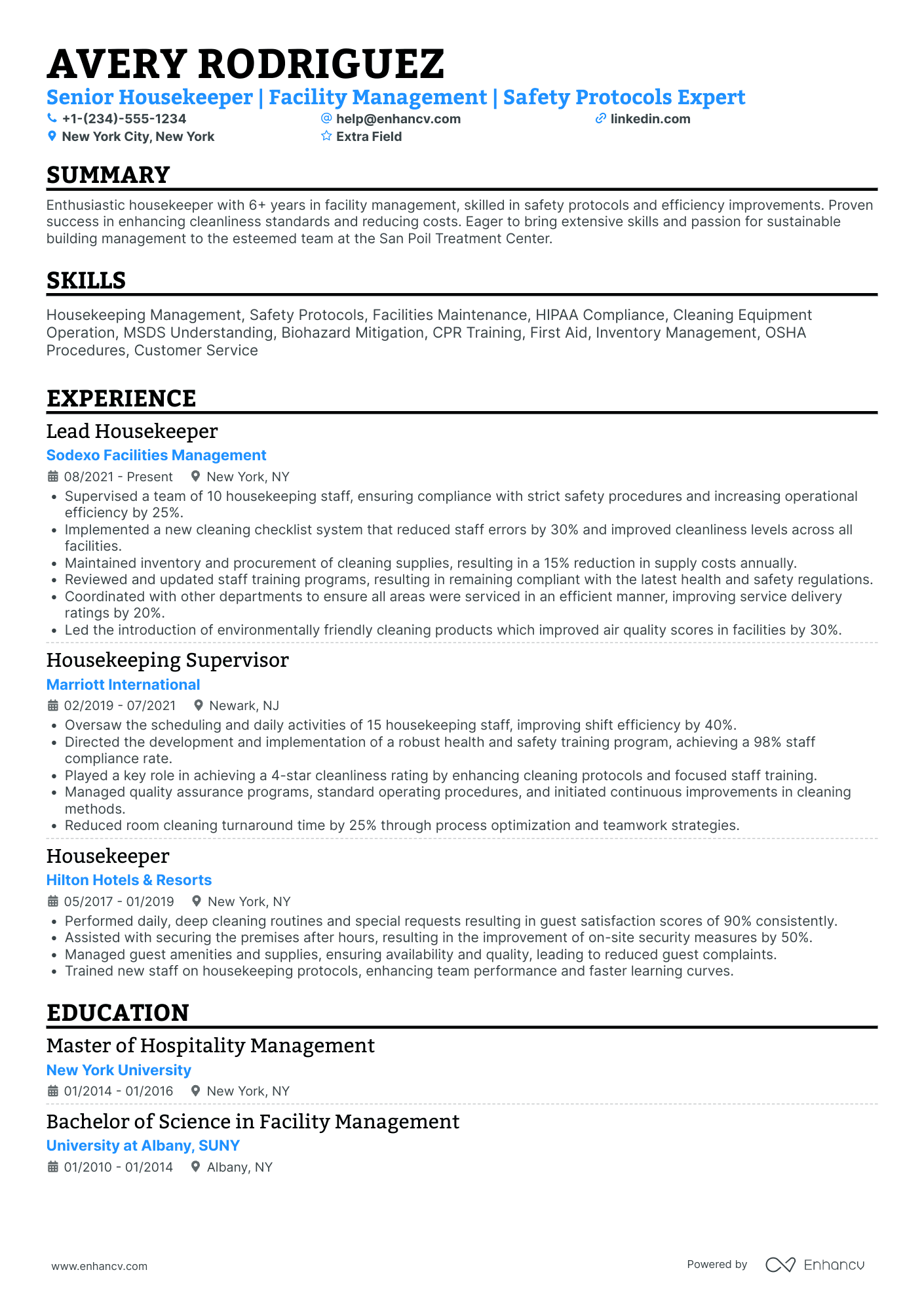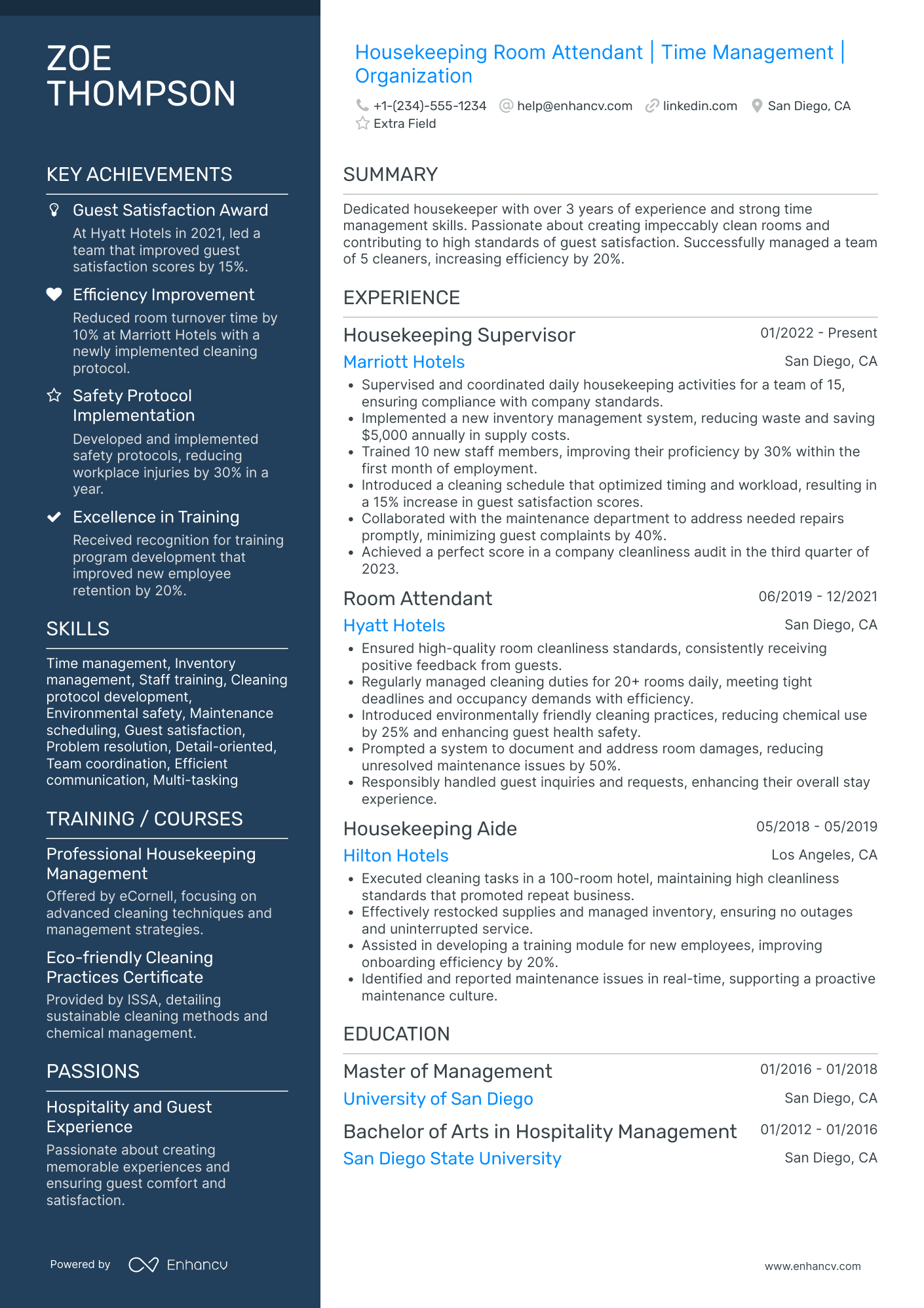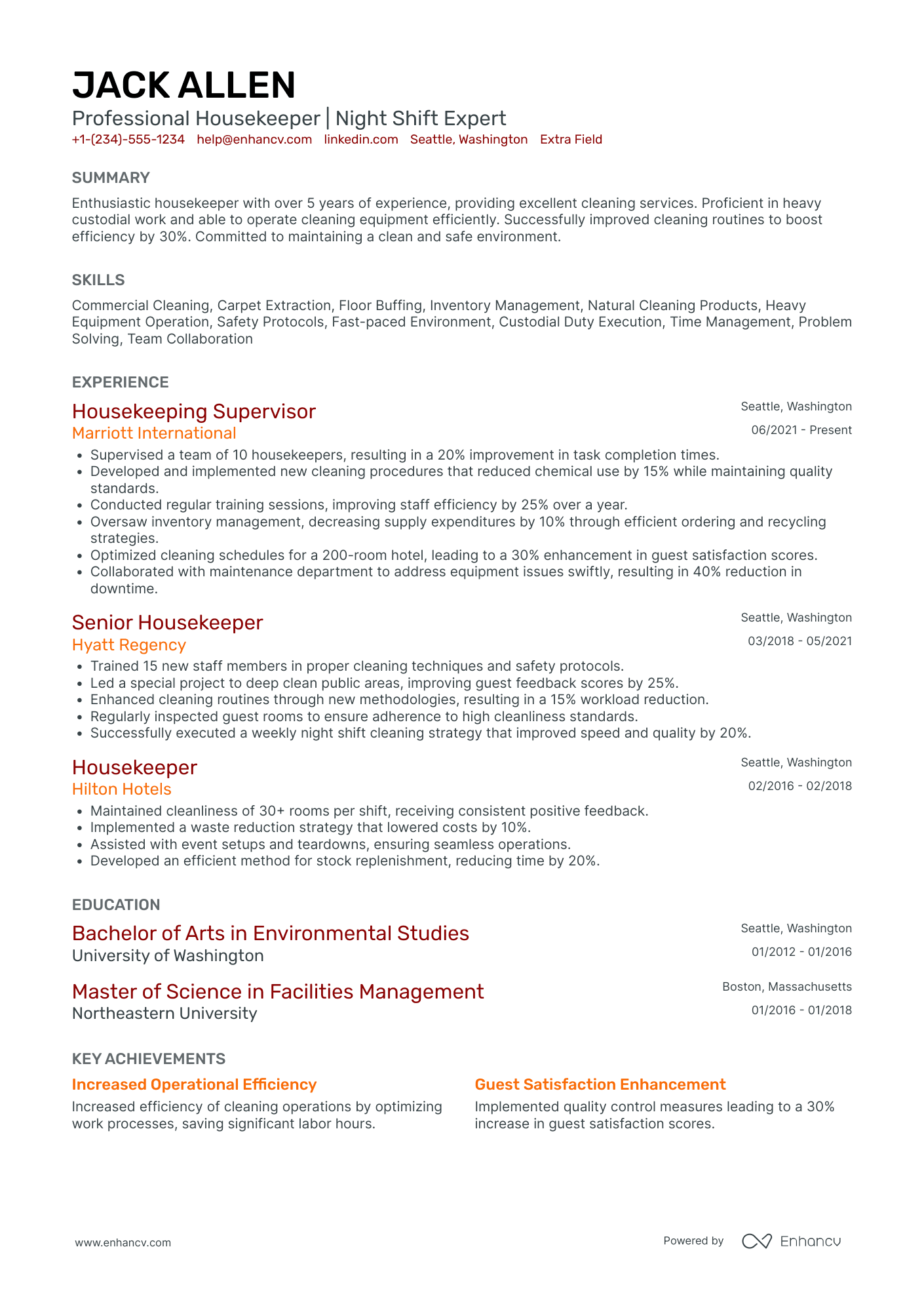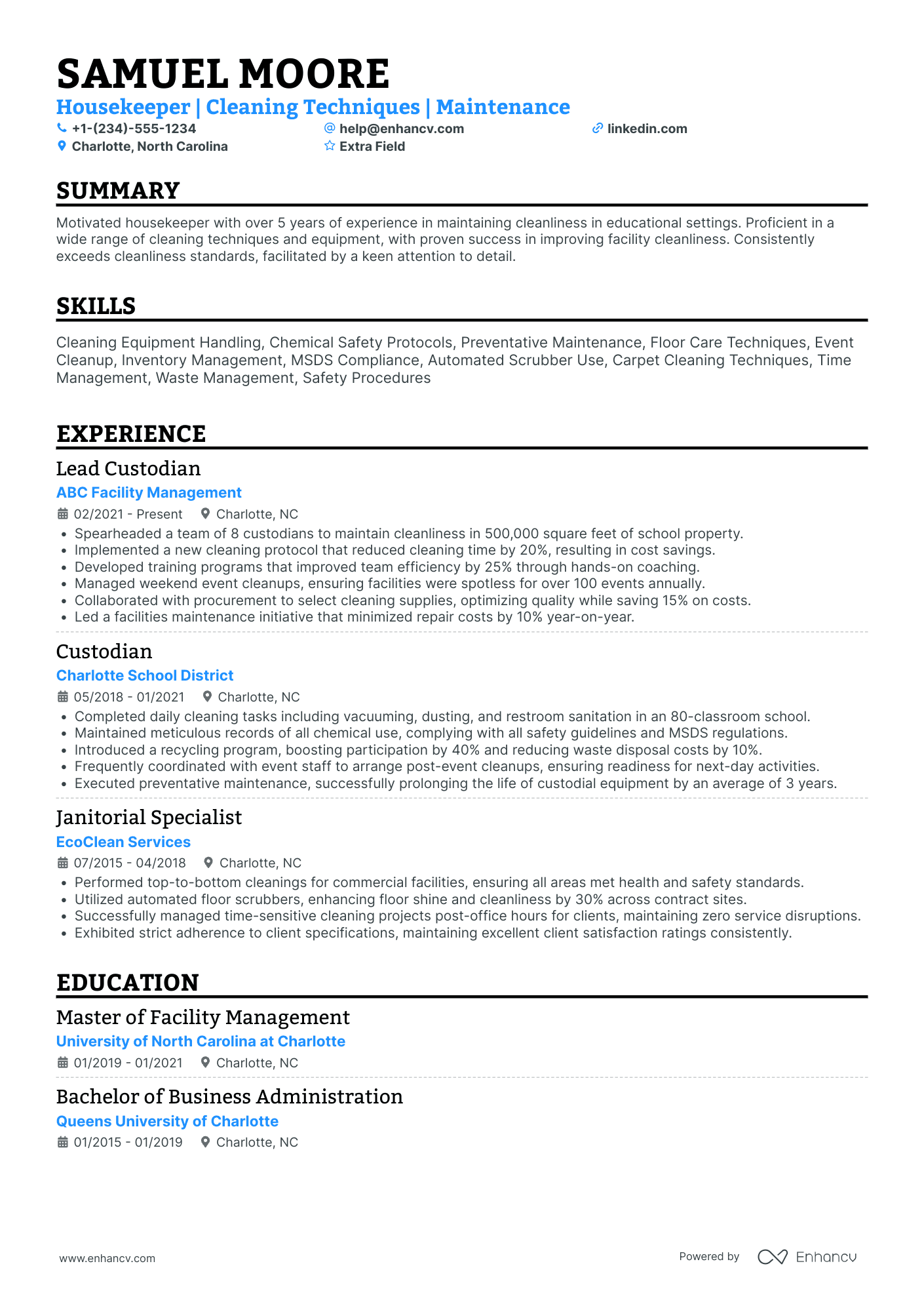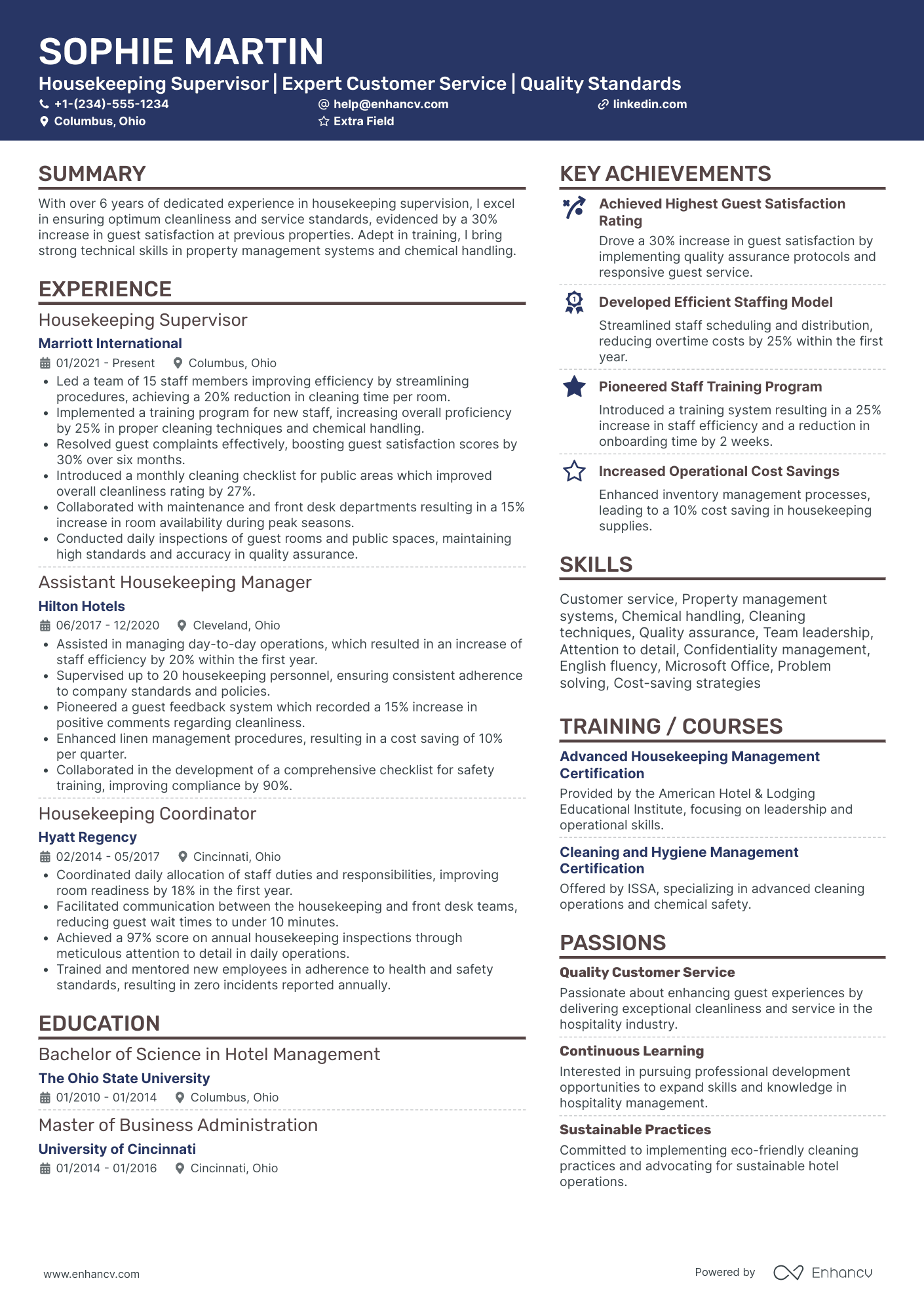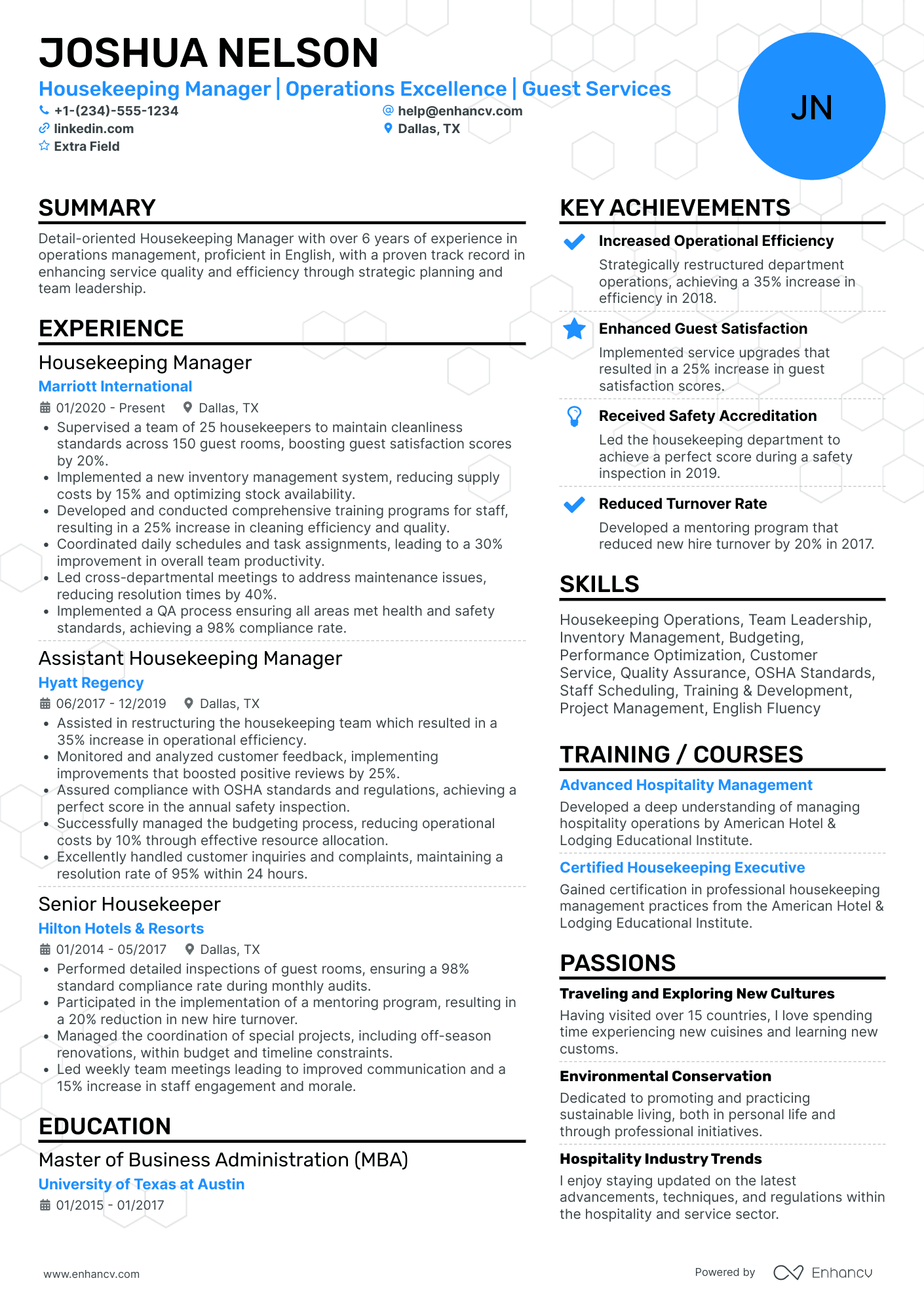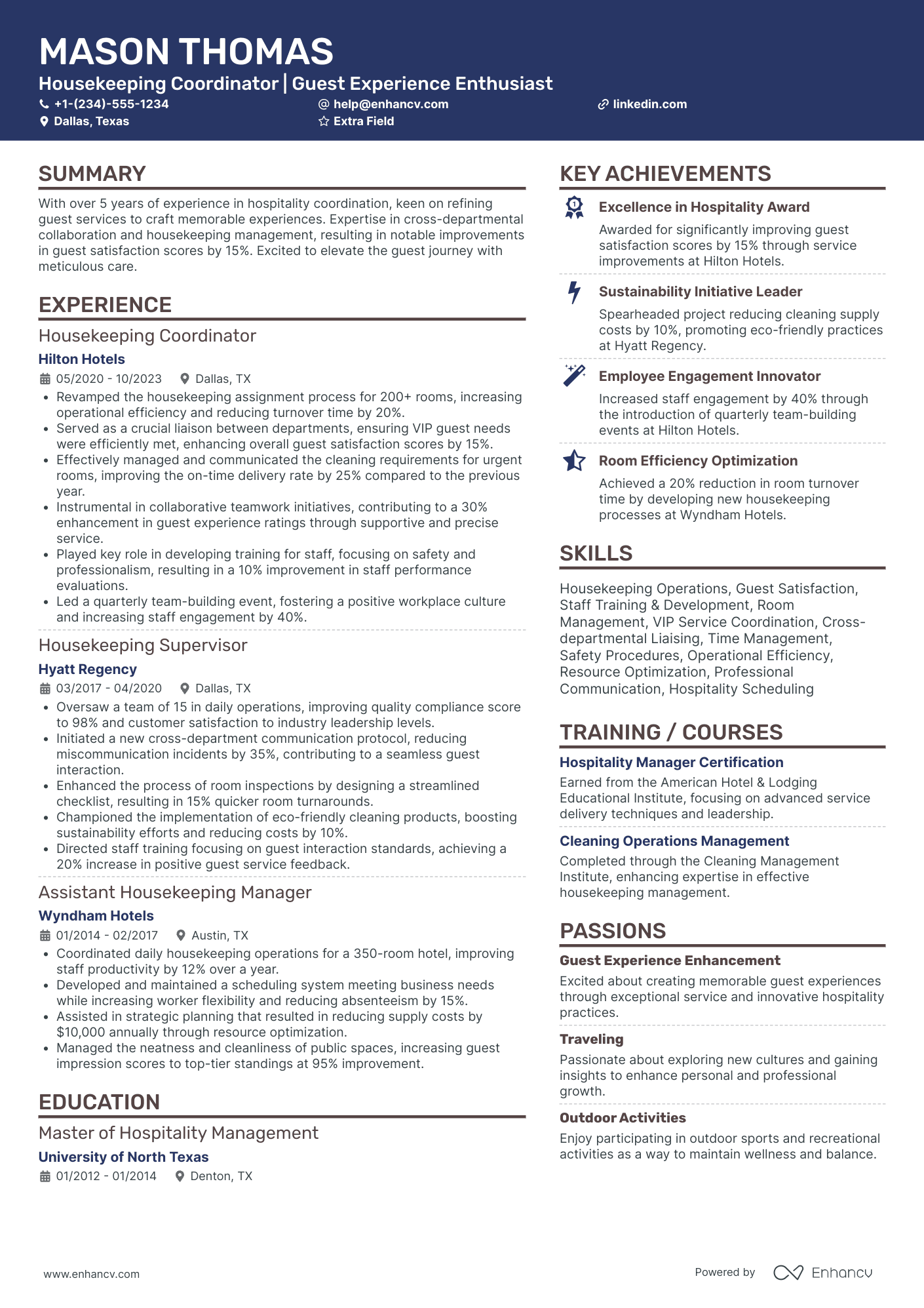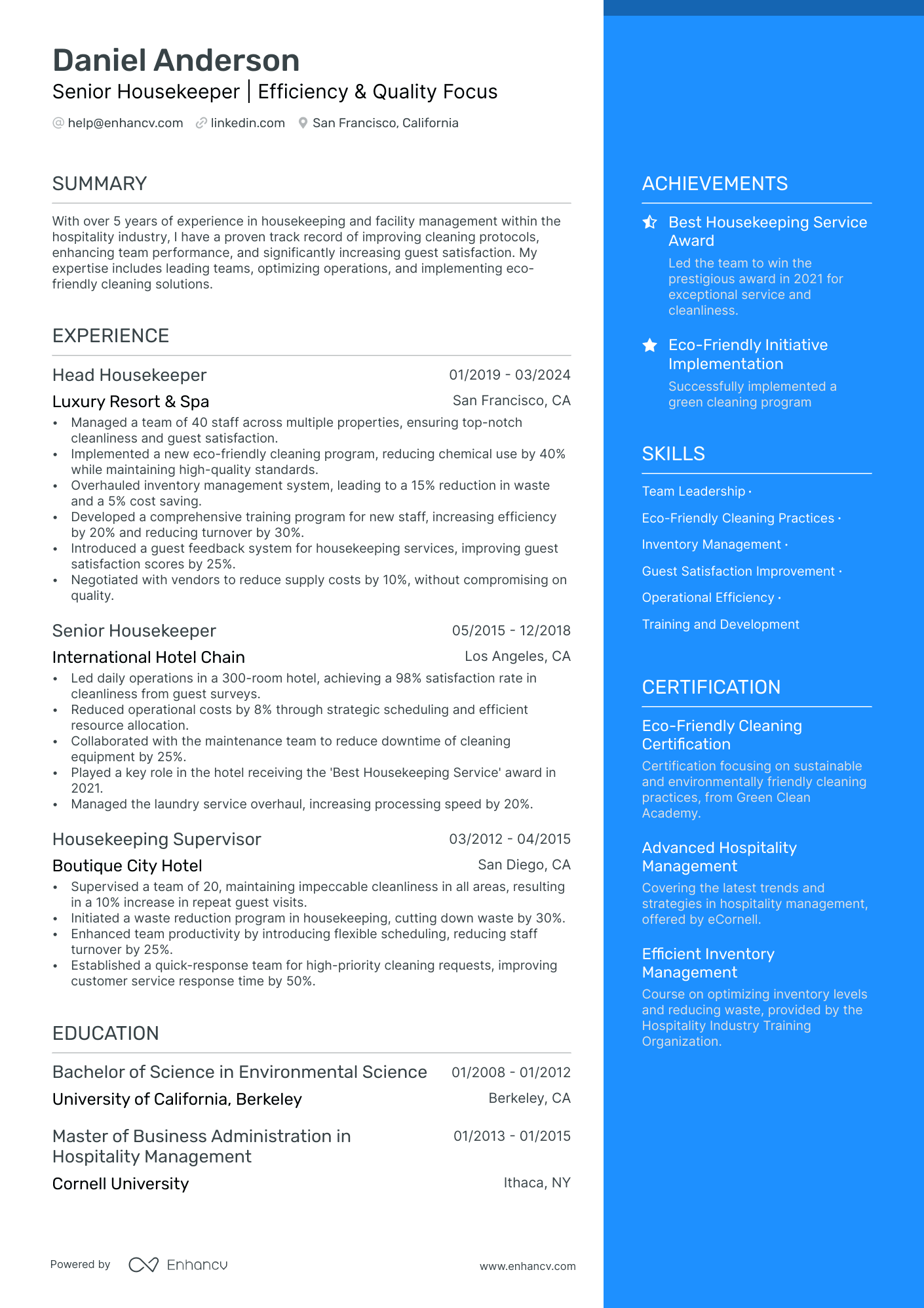Crafting a standout resume for a housekeeper position is your first step toward securing a role in this essential and rewarding field. With a high demand for high-quality candidates, it’s recommended that you take a look at the current situation as things can vary greatly state by state—get more acquainted with the details through the Bureau of Labor Statistics. Whether you're aiming to work in a bustling hotel, a private residence, or a healthcare facility, your resume is a vital tool to highlight your skills, experience, and dedication.
In this guide, we'll walk you through creating a resume that shines as brightly as the spaces you're passionate about maintaining.
Here’s what we’ll cover:
- The most effective way to format your resume making it easy to read and able to pass through the filters that recruiters may have in place.
- Some common problems facing housekeeper applicants and what recruiters are looking out for.
- Proper ways to list both your work experience and education (including certifications and licenses).
- What skills to include on your resume in order to present yourself as the ideal candidate.
- Impressing with an incredible resume summary or objective statement.
Housekeepers contribute to our peace of mind and quality of life. They’re the unsung heroes who ensure our environments aren’t just clean, but also comforting and healthful.
Anonymous
Looking for a different position in the same field? Check out these related guides.
Interested in learning more about the housekeeping industry? Check out statistics here.
The right format for a housekeeper’s resume
When crafting a resume for a housekeeper position, choosing the right resume format is crucial to highlight your strengths and match the job requirements. Here are the three most common resume formats explained, along with advice on which might be best for a housekeeper:
Reverse chronological resume
- Description: The reverse chronological resume lists your work experience starting with your most recent job at the top. It focuses on your work history and showcases a clear timeline of your professional growth.
- Best for: housekeepers with a solid work history in the field, especially if you have a series of jobs that show upward progression or increasing responsibility.
Functional Resume
- Description: A functional resume emphasizes skills and abilities rather than a chronological work history. It groups professional experiences under skill categories, showing how they match the job you’re applying for.
- Best for: Those who are changing careers, have gaps in their employment or are entering the workforce for the first time. It allows you to highlight specific housekeeping skills and competencies without focusing on when or where you acquired them.
Hybrid (Combination) Resume
- Description: Hybrid or combination resumes combine elements of both the chronological and functional formats. They start with a section that highlights your skills and accomplishments, followed by a reverse chronological listing of your work history.
- Best for: housekeepers who have a mix of solid work experience and specific, relevant skills they want to highlight. It’s useful for those looking to draw attention to both their professional journey and the competencies that make them ideal for the role.
Ultimately, your choice should reflect how your experiences and skills make you the best match for the housekeeping position you're applying for.
Different markets have specific resume formats – a Canadian resume could vary in layout.
Is your resume good enough?
Drop your resume here or choose a file. PDF & DOCX only. Max 2MB file size.
Besides the format you choose, you’ll need to keep an eye out for a few more global elements while writing your housekeeping resume.
- Choose a clean layout: Opt for a simple, elegant design that allows your content to shine without distracting graphics. Keep the layout professional, and readable, maintaining a resume length of no more than a page or two long.
- Customize for the job: Tailor your resume for each application based on the job description. Highlight experiences and skills that match the job's requirements using keywords.
- Use professional language: Maintain a professional tone throughout your resume. Use action verbs to describe your responsibilities and achievements.
- PDF format and fonts: Many people ask if they should format their resume in PDF or Word - the answer is to always submit it in PDF. It preserves the layout and design across different devices and platforms. Also, choose the right resume font - Rubik, Lato, Montserrat, Raleway, Exo 2, Volkhov, serif, or sans-serif fonts.
- ATS compatibility: Applicant tracking system (ATS) software scans resumes and cover letters to weed out applicants based on factors set by the employer. This can include resume keywords, design and resume layout, length, and salary requirements.
If you have a minute or two, check out more of Enhancv’s resume tips.
Here are the individual sections that you’ll need to focus on while applying for a housekeeping position.
The top sections on a housekeeper’s resume
- Contact information: It’s essential to provide accurate contact details so employers can quickly and conveniently reach out for potential interviews.
- Objective statement or summary: This is where you would write a brief, compelling statement about your professional goals as a housekeeper and what you bring to the table.
- Work experience: Highlighting your previous housekeeping roles is crucial to show your potential employer that you have the required hands-on experience.
- Skills and qualifications: This allows you to showcase your housekeeping skills, such as attention to detail, time management, ability to work under pressure, and cleanliness standards.
- References: Including trustworthy references can back up your stated skills and experiences, enhancing your credibility and trustworthiness.
Many housekeepers often face obstacles when it comes to producing a successful resume. Here are a few of them—don’t forget that obstacles exist so you can overcome them!
- Lack of technical skills: Since housekeeping often involves using various types of cleaning equipment and tools, a lack of technical knowledge can be a significant challenge. Housekeepers must be able to convey their familiarity with different types of cleaning tools and chemicals.
- Inability to quantify accomplishments: In housekeeping, achievements are often vague and hard to measure. For example, it's difficult to quantify how clean a room is or how happy a guest was with the service. This can make the process of listing accomplishments challenging.
- Limited relevant websites or institutions: Unlike some other professions, housekeeping lacks specific, recognized institutions or websites where one can gain accreditation or certifications. This makes the resume-building process more dependent on practical experience and references.
- Difficulty showcasing soft skills: Housekeeping is a profession that relies heavily on soft skills like attention to detail, reliability, and great customer service. Expressing these subtle skills convincingly on a resume isn't easy, making it a notable challenge.
- Low impact of job boards: Typically, housekeeping positions aren't regularly posted on mainstream job boards such as LinkedIn or Indeed. So, it's difficult for housekeepers to gain visibility or stand out amidst other professionals in different areas, making it a unique challenge.
Another aspect to consider is that recruiters often want to see the same thing when they read a resume. Below you can find a few of these things related particularly to housekeeping that your resume can’t do without.
What recruiters want to see on your resume
- Previous housekeeping experience: Recruiters prioritize this as it shows that a candidate already has a fundamental understanding of the job requirements and likely requires less training.
- Attention to detail: This trait is essential for a housekeeper as their role includes noticing and taking care of minute details to maintain immaculate hygiene standards.
- Ability to work independently: This skill is desirable because housekeepers often work alone or with minimal supervision, and they need to be able to take initiative.
- Physical stamina and agility: These are important for a housekeeper as the job often involves physical tasks such as lifting, bending, and consistent movement throughout a workday.
- Pleasant disposition: A pleasant and friendly demeanor is valued because housekeepers interact with a range of people and their professionalism and positivity affect the image of their employer.
Moving on now to the actual information you’ll need to present on your next resume. First things first—your work history.
Presenting your housekeeper work experience
The first thing we need to focus on is your work history on a resume. It showcases your experience, reliability, and specialization areas, which all directly reflect whether or not you can actually do the job efficiently. While other sections are important, work history definitively illustrates your practical skills and accomplishments.
For a housekeeper position, best to start with your most recent job and work backward. Include the job title, employer, location, and dates of employment. Also, be sure to include bullet points of your responsibilities and achievements, starting with strong action verbs to describe them. Be specific about tasks you excelled at or initiatives you introduced, such as "Implemented a green cleaning program that reduced chemical use by 30%."
Have a look at the following example of how you should NOT list your experience.
- •Did cleaning.
- •Took care of rooms.
- •Used cleaning stuff.
Why this isn’t a good example:
- Vague descriptions: Terms like "Did cleaning" and "Used cleaning stuff" are overly broad and don’t convey specific tasks or the skills used.
- Lack of detail: "Took care of rooms" doesn’t specify what taking care involved, such as dusting, vacuuming, or deep cleaning.
- Missing achievements: There are no achievements or examples of initiative that would set the candidate apart from others.
- Passive language: Using active language like "Managed," "Implemented," or "Reduced" can make the entry more compelling.
- No results shown: It's beneficial to show the results of your work, such as improvements made or compliments received, to add value to your contribution.
Now, check out a much better way to present your work history.
- •Managed a team of 5 housekeepers, coordinating schedules and ensuring high standards of cleanliness across all assignments.
- •Implemented eco-friendly cleaning techniques, reducing chemical use by 40% and improving client satisfaction scores by 25%.
- •Developed a comprehensive training program for new hires focusing on efficiency, safety, and customer service excellence.
- •Received the “Employee of the Year” award in 2020 for outstanding performance and dedication.
Why this is an outstanding example:
- Company description: Adding a brief description of the company provides context about the work environment and highlights the relevance of the candidate's achievements within the company’s goals.
- Detailed responsibilities and achievements: The bullet points clearly articulate the candidate’s roles, initiatives, and quantifiable results, which are essential for showcasing effectiveness and leadership.
- Action-oriented language: Using action verbs conveys a proactive attitude and competence in the role.
- Recognition: Mentioning awards recognizes excellence and distinguishes the candidate from others.
- Eco-friendly focus: Highlighting eco-friendly practices aligns with current environmental concerns, showing awareness and adaptability to industry trends.
Perhaps you’re wondering if there are any other ways you can impress with your experience and the answer is yes. Besides paying special attention to the job description to target your resume with accurate use of resume keywords, follow the tips below to really make this section shine.
Quantify impact on your resume
You can quantify your impact by using the right numbers on your resume. This is crucial because it provides concrete evidence of your contributions and achievements. Try doing these things on your resume:
- Include the number of rooms cleaned per shift: This shows your ability to handle large workloads and manage time efficiently.
- Specify the size of the property or properties you've managed: The recruiter will understand the level of responsibility you had, especially if you worked in larger areas.
- Quantify the types of cleaning tasks you’ve done: This indicates your versatility and range of housekeeping skills, such as "Proficient in the use of 5 different types of cleaning equipment for various tasks."
- Mention how many special cleaning projects you've taken on: Showing your willingness to handle additional tasks, like deep carpet cleaning or pressure washing, demonstrates initiative.
- If appropriate, note any decrease in supplies costs you've managed to achieve: This shows your ability to work effectively and cost-efficiently.
- State how many shifts you've worked without absences: This exemplifies your reliability and commitment to the job.
- Quantify the number of positive feedbacks or recognitions received from employers or clients: This will emphasize your effectiveness in the role and commitment to quality service.
- If you've trained others, specify how many people and what the training was about: This can indicate leadership skills and a deep understanding of housekeeping.
Creating a housekeeper resume without any experience
You don’t always need direct work experience to land a job—everyone has to start somewhere. So if you find that you’re one of these people, you can strengthen your resume by focusing on transferable skills and other relevant sections that demonstrate your ability to excel in the role.
In the last section of this article, we go through some useful additional aspects you could list to improve your chances of successfully getting the job. Our advice is to include them as much as possible, especially if you lack work history and/or formal education.
Remember, your attitude, willingness to learn, and ability to show how your current skills translate into potential success as a housekeeper are key. Tailor your resume to focus on these strengths and how they make you a great fit for the job.
How to list your hard skills and soft skills on your resume
Including a diverse resume skills section demonstrates essential competencies, adaptability, and professionalism, absolutely essential for both experienced cleaners as well as newcomers. It boosts your resume visibility via applicant tracking systems (ATS) and aligns with job requirements, shining a light on your resume in a very competitive field.
- Hard skills for a housekeeper resume involve specific, teachable abilities like cleaning techniques, operation of cleaning equipment, and knowledge of cleaning chemicals.
- Soft skills on a resume include personal attributes and interpersonal skills such as reliability, attention to detail, communication, and customer service.
Best hard skills for your housekeeper resume
- Floor cleaning and waxing
- Carpet cleaning
- Use of industrial vacuum cleaners
- Laundry management
- Waste disposal management
- Stain removal
- Glass cleaning
- Sanitation
- Guest room servicing
- Upholstery cleaning
- Knowledge of cleaning agents and chemicals
- Use of steam cleaners
- Use of scrubbing machines
- Knowledge of OSHA safety guidelines
- Pest control
- Window washing
- Power washing
- Equipment maintenance
- Pool cleaning
- Deep-cleaning tasks
Best soft skills for your housekeeper resume
- Time management
- Detail orientated
- Organizational
- Self-motivation
- Physical stamina
- Independent
- Flexibility
- Reliability
- Communication
- Interpersonal
- Problem-solving
- Decision-making
- Patience
- Ability to handle objection
- Adherence to standards
- Initiative
- Discretion
- Respect for client confidentiality
- Resilience
- Respect for diversity and inclusion
The ideal number of skills to list on your resume typically ranges from 5 to 10. Choose skills that align closely with the job description and highlight your strengths and suitability for the position. It's important to tailor this section for each application to reflect the skills that match the employer's requirements.
Want to learn more about listing skills? Check out Enhancv’s informative article on skills and read up on all the benefits of having an amazing skills section on your resume!
How to list your certifications and education on your resume
For a housekeeper's resume, certifications often hold more immediate relevance than formal education, especially if they’re directly related to housekeeping, cleaning techniques, safety protocols, or specialized equipment use.
Certifications on a resume can quickly demonstrate to employers that you possess specific skills and knowledge that prove you’re ready to tackle the job effectively from day one. However, this doesn't diminish the value of listing education on a resume, particularly if it relates to hospitality, business, or other areas that can contribute to the role.
Ideally, include both if available, with an emphasis on certifications that directly enhance your qualifications for the housekeeping position. Below, we’ll show you an ideal example of each.
Certifications
A certification listing on a resume should include the following elements to provide clear and comprehensive information:
- Certification name: Clearly state the full name of the certification to ensure it's easily recognizable and understood by the reader.
- Issuing organization: Include the name of the organization or institution that issued the certification.
- Date of certification: Mention the month and year you obtained the certification. If the certification has an expiration date, consider including that as well to show current validity.
- Relevance and skills acquired: Briefly describe how the certification is relevant to the job you’re applying for, highlighting any specific skills or knowledge gained.
- •Demonstrates advanced knowledge in hospitality housekeeping management, focusing on operational efficiency and high standards of cleanliness.
What they did right:
- Specific title: Clearly stating the title of the certification makes it easy for hiring managers to understand the professional qualifications.
- Issuing organization: Including the name of the organization adds credibility and allows employers to verify the credentials if needed.
- Date of certification: Mentioning the date shows how current your knowledge and skills are.
- Relevance to the job: Each certification is directly relevant to housekeeping, highlighting specialized skills that can set the candidate apart from others.
- Details on skills gained: Providing a brief description of what the certification covers, such as management skills, gives insight into the candidate’s capabilities and areas of expertise.
Education
Now, to give you an example of an education entry. Such a listing on a resume should typically include the following elements:
- Degree: Specify the degree, including the field of study or major if applicable.
- Institution name: Include the name of the institution where you earned the degree.
- Location: Mention the city and state where the institution is located.
- Graduation date: List the month and year of graduation. If you're currently enrolled, you can say "Expected graduation [month, year]."
- Relevant coursework or projects: You can include relevant coursework or projects that directly relate to the job you're applying for.
- Honors and awards: Mention any academic honors, scholarships, or awards you received that demonstrate your excellence or achievements in your field of study.
- GPA: Including your GPA on a resume is optional and typically recommended if it’s above 3.0 or if you are a recent graduate.
- •Specialized coursework in Hotel Operations Management and Customer Service Excellence.
- •Completed a capstone project on , focusing on eco-friendly and efficient cleaning practices.
- •Participated in a semester-long internship with XYZ Hotel, gaining hands-on experience in housekeeping and guest relations.
What they did right:
- Clear format: The education section is clearly formatted with the degree, institution name, and graduation date, making it easy to read.
- Relevant coursework: Mentioning specialized coursework that directly relates to housekeeping and hospitality adds value, showing specific knowledge and skills in the field.
- Practical experience: Including a project and internship experience demonstrates a practical application of learned skills, particularly those that can be transferred to a housekeeping role.
- Focus on relevance: Highlighting aspects of their education that are most relevant to housekeeping, such as eco-friendly practices and customer service, makes the resume more targeted and compelling to potential employers.
Here’s a list of some of the more recognized and sought-after certifications available to housekeepers.
Best certifications for your housekeeper resume
Writing a convincing housekeeper resume summary or objective
A resume summary or objective statement highlights your aspirations and qualifications at the resume's start, immediately capturing the employer's attention. Place it at the top, following your contact information (header).
Let’s look at what you need to aim for while writing one and then a few tips on doing it properly.
A summary: For those of you with a housekeeping history. Highlight your years of experience, key skills, and major achievements. Use active language and quantify achievements when possible.
An objective: This one’s suited for entry-level or career-changers. A resume objective focuses on your career goals and how they align with the job. Mention any relevant skills or qualities you bring.
Write it by:
- Choosing the right type: Decide between a summary or objective based on your experience level.
- Tailoring to the job: Customize it to the job description, focusing on what the employer values.
- Being specific and concise: Keep it brief but informative, using specific examples or numbers to illustrate your qualifications or goals.
- Using keywords: Incorporate keywords from the job description to pass applicant tracking systems (ATS).
Here’s an example of a wrong and a right way of writing your summary.
What they did incorrectly:
- Lack of specificity and professionalism: The summary is vague, lacks professional language, and fails to quantify experience or highlight specific skills, making it difficult for employers to gauge the candidate's qualifications or dedication.
- Personal reasons over value contribution: Focusing on personal needs for employment ("because I need a job") rather than how the candidate can contribute value to the employer doesn’t present a compelling case for hiring.
What they did correctly:
- Specific experience and skills: It clearly states the number of years of experience and specific areas of expertise, such as eco-friendly cleaning practices and team leadership, making it immediately clear what the candidate brings to the table.
- Quantifiable achievements: Mentioning improvements in efficiency and client satisfaction, along with receiving high marks for service, provides tangible evidence of the candidate’s impact in their previous roles, making the summary more compelling.
So, take your time and carefully craft this paragraph in a way that truly depicts who you are and what you can give. Make the recruiter want to read more!
Optimize your resume summary and objective for ATS
Drop your resume here or choose a file.
PDF & DOCX only. Max 2MB file size.
Additional sections for a housekeeper resume
If you're crafting a housekeeper resume without specific education or direct experience in the field, or if you just want to fill some space and be a more attractive candidate—including additional sections can help showcase your potential to employers. Here are some useful sections to consider:
- Volunteer work: If you’ve done any volunteer work that required organizational, cleaning, or team coordination skills, list these experiences. Describe your responsibilities and any positive feedback you received.
- Personal projects: If you’ve undertaken any personal projects relevant to housekeeping, such as organizing community clean-up events or managing household tasks for a family member, include these. Explain the tasks involved and the outcomes.
- Languages: Possessing language skills can be a significant asset, especially in diverse communities or hospitality settings where communication with clients or team members in their native language is valued.
- Interests and hobbies: Include interests or hobbies that demonstrate skills relevant to housekeeping, such as gardening (attention to detail), DIY projects (handiness and creativity), or participation in sports (physical stamina and teamwork).
- Awards and recognitions: Any awards or recognitions you've received that reflect your work ethic, leadership, or team contribution can be relevant. These acknowledgments show potential employers that others have recognized your efforts and achievements.
- Professional references: If you lack professional experience in housekeeping, references on a resume from past employers or instructors who can attest to your character, work ethic, and potential can be incredibly valuable. Make sure to include people who can provide positive and relevant testimonials about your abilities and character.
By thoughtfully including these sections, you can create a comprehensive resume that highlights your suitability for a housekeeping position, even if you don’t have direct experience or specific education in the field.
Key takeaways
Here’s what you should be taking away:
- Choosing your resume format is essential and needs to be determined by several factors. Your choice is a reflection of the way in which your experiences and skills make you the best match for the specific position you're applying for.
- Whether it’s your work experience or education, your credentials need to be listed starting with the most recent and working your way backward. This clearly illustrates your professional evolution.
- Don’t just list things you’ve done—make everything quantifiable! Use numbers to better demonstrate your value.
- Choosing the right hard and soft skills to present on your resume is vital. Be sure that they’re relevant to the job description.
- Although education is important, as a housekeeper it’s certification and licenses that really highlight a candidate.
- Be sure to dedicate enough time and energy to crafting an impressive resume summary or objective to convince any recruiter that they need to continue reading.
- Lastly, don’t be put off if you have a lack of experience. There are several other additional sections and talents you can showcase to compensate for any missing professional history.
Housekeeper resume examples
By Experience
By Role

